

13 Reasons Why Your AC Keeps Tripping Breaker (And Fixes)

Josh Mitchell
Expert Reviewed By
Last Updated On
December 23, 2023
“If you make a purchase using our provided links, we may receive a commission. Learn more here.
Key Takeaways
- An AC breaker can trip if it is overloaded with many appliances, if there is a short circuit in the unit, or if the breaker is not sized properly.
- Dirty and faulty components in an AC can often cause a breaker to trip frequently. It is also possible for a malfunctioning breaker to be the culprit.
- Electrical faults are very dangerous and you should not attempt to fix them yourself. Hence, always consult with an HVAC professional.
When the AC is tripping your electricity, it’s important to pay attention and quickly diagnose the problem.
As an experienced HVAC professional, I know all the common issues that can cause your AC system to trip the breaker.
I’ll share my knowledge and help you get your air conditioner running again quickly.
13 Common Reasons Why Your AC Trips The Circuit Breaker (Solutions Included)
AC electrical faults cause 86% of dangerous air conditioner fires[ 1 ], and circuit breakers help you stop that from happening - but only if you know why it’s happening and what to do next.
1. The Sizing Of The Breaker Is Improper
Circuit breakers are rated by amp s , determining the amount of current that can flow through without tripping the breaker.
The average home circuit breaker is 15-20 amps for the branch circuit , which is plenty for most home AC units, but larger air conditioning systems using too many amps can cause the circuit breaker to trip[ 2 ].
You can either:
- Move your air conditioning unit to a different place/room with a larger AC circuit breaker,
- Hire a professional to upgrade the breaker and accompanying wiring.
TL;DR: If rated amps of a circuit breaker are lower than the rated amps of the AC, it will always trip.
2. You Are Overloading The Circuit
Each circuit breaker can only handle a certain amount of amps.
If you have other devices running through the same circuit breaker as your air conditioning system, it can o verload the AC circuit breaker and shut off your power.
Reroute other electrical devices so your AC unit can run through the breaker independently. You may need a professional to help.
TL;DR: A dedicated circuit is recommended for an AC. If too many appliances are connected to the AC circuit, it can get overloaded resulting in breaker tripping.
3. There Is A Short Circuit With The Electronic Components
ACs have internal electrical components that run continuously for hours.
Over time, the wires within the air conditioner can become damaged, leading to a ‘short’ (or short circuit)[ 3 ].
A 'short' means too much electricity is flowing through the wires and can cause overheating and fires.
The air conditioner circuit breaker will trip to shut off power and protect your home from danger.
You need to contact a professional to find the source of the short circuit and make appropriate repairs.
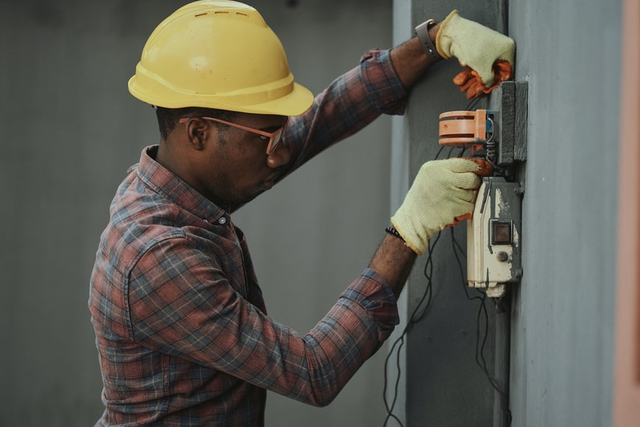
TL;DR: A short circuit is a very dangerous condition as it is a sign of damaged electrical components. Seek professional help if you suspect this is the case.
4. A Dirty Air Filter Heating Up Your AC
The air filter in your AC unit will get dirty over time as air flows through the machine (more so with an outdoor unit than an inside unit).
If the air filters become too dirty, they can reduce airflow and cause your air conditioner to overheat, as the electric motors must work harder.
Your air conditioner will try to draw more power to compensate for the poor airflow, tripping the breaker.
Change or clean the dirty air filter to stop your AC system from tripping the breaker.
You should be able to replace the air filter and perform regular maintenance yourself.
Important Note:
It is crucial to point out that you should avoid DIY maintenance if you have the slightest hint of doubt that things may go wrong. To avoid harming yourself or damaging your unit, always consider hiring professional help.
5. Dirty Condenser Coils Can Also Heat Up Your AC
Your condenser coils absorb the heat from the air, but they can become blocked by dust or debris (particularly if you have a dirty outside unit).
The dirty coils can strain your air conditioning system, causing it to work harder and draw more electricity.
They may lead to it tripping the breaker.
Cleaning dust and debris off the dirty condenser coils should stop the AC tripping.
You should also have an AC technician check and perform annual maintenance on your condenser.
TL;DR: Dirty filter and dirty condenser coils can heat up the internal components. Higher heat results in higher current draw resulting in your breaker tripping. Perform regular cleaning of these components.
6. Problem With Coil Fan Motor
Air conditioners use a coil fan (or AC blower) to move hot air over the condenser coil and disperse heat, leaving you with cold air.
Your coil fan can become damaged over time , and a broken coil fan can cause the AC to draw too much power, leading to the breaker tripping.
Hire a professional to perform AC repair work on the coil fan motor. It may need to be replaced to stop the breaker tripping.
TL;DR: A broken coil fan motor can draw more than its rated current, which in turn can trip the breaker.
7. Your Compressor Has Gone Bad
Your compressor houses the refrigerant that cools the air, but a faulty compressor won't cool the air.
Faults become more common as a compressor ages but can happen because of accidental damage.
A bad compressor can cause two issues:
- Hard starting. Your faulty compressor won't start up properly and draws more power to try and compensate, causing it to trip its own breaker.
- Grounded compressor. The wires connected to the compressor come loose, leading to a short circuit and a tripped breaker.
A technician can install a hard start kit to try and get the compressor started.
However, a faulty compressor can mean costly repairs, and it's often best to replace the entire system rather than try to fix it.

TL;DR: If the compressor is hard starting or if it is grounded, then it will draw far more than its rated current.
8. Cables And Wires Wear And Tear
Your AC runs has wires running inside the whole unit connecting electrical components.
Over time, the wires and wire insulation can become loose or damaged.
Loose wires touching the ground, floor, or other components can cause further damage to the device and your home.
The circuit breaker trips as a safety measure to avoid an electrical short and prevent damage.
Some electrical wires can be an easy fix, but electrics can be dangerous.
Have an HVAC technician check the electrical panel of the unit, find the damage, and perform the AC repair safely.
A loose wire or a grounded wire is a dangerous safety hazard. You should avoid touching or going near the unit if you spot a loose connection.
9. Too Little Refrigerant
Refrigerant is the working fluid in an AC unit that cools the air.
The AC compressor has a closed system for the refrigerant, but over time, refrigerant lines can become damaged.
This damage can lead to refrigerant leaking out.
The AC compressor coils will have to work harder to cool the air if there's less refrigerant.
The unit draws more electricity to compensate, which trips the breaker.
Hire a professional to top up the refrigerant and seal the leak.
However, it may be cheaper to replace cheaper portable ACs than perform the repairs if it's out of warranty.
Refrigerant is a dangerous substance and can only be handled by professionals.[ 4 ]

TL;DR: Lower refrigerant means that the AC has to work harder in order to cool. This in turn means using up more amps to compensate. More amps = breaker tripping.
10. Frozen Evaporator Coil
Dirt, debris, and grime can build up on the evaporator coil, preventing heat from flowing and causing the coils to freeze.
The air conditioner will try to draw more energy to compensate for the frozen coils , but as it draws more amps, it can cause the breaker to trip.
You can fix this yourself by turning the power off and thawing out the compressor using a hair dryer.
Once dry, clean the evaporator coils to prevent them from malfunctioning and freezing over again.
If your air conditioner keeps tripping after this, contact a professional to determine the root cause.
11. It’s Too Hot Outside
Your air conditioner has to work harder in hot conditions to maintain the temperature, which can cause it to draw more electricity and strain the wiring.
It can also cause the breaker to trip to prevent overheating or fire hazards.
Clean the AC to keep the unit cool by improving airflow, and only use the air conditioner when needed.
If it keeps tripping the breaker, you may need to buy a new AC.
TL;DR: If the internal components are heating up due to very hot weather outside then this can lead to the breaker tripping to avoid fire hazards.
12. Failing Air Conditioning Capacitors
Your AC capacitor provides the initial jolt of electricity so it can start.
Capacitors wear out over time, and if you notice your AC has trouble starting or keeps tripping, the capacity may be failing.
Contact an HVAC professional to fix or replace the bad capacitor.
13. You Have A Defective Circuit Breaker
A circuit breaker can become defective through natural wear and tear, exposure to extreme temperatures, or by electrical faults tripping the breaker too frequently.
A defective breaker can trip your electricals every time you use your AC.
First, make sure the breaker is actually defective.
Circuit breakers trip electrics and protect your home, a nd you should only replace them as a last resort.
If you don't resolve the issue, the new breaker will continue to trip.
Check the other common causes on the list or consult an HVAC technician to determine the issue. A professional will need to replace the circuit breaker.
TL;DR: If all else is fine, then the likely culprit is a defective breaker. Most homes have a spare breaker which you can switch your AC to. If not, then a breaker replacement will be necessary.
When To Call Professionals For Maintenance Or Repair
I recommend calling a professional to help with most air conditioning electrical problems because it can be dangerous.
Always consult a professional if you experience any of the following:
- 1 There is a burning smell from the breaker or AC: A burning smell indicates that your electrical wiring or AC breaker is overheating. It's a dangerous fire hazard, and you should shut off the air conditioner and contact an HVAC technician immediately.
- 2 There are crackling or electrical sounds from the breaker or AC: Strange noises from your inside unit usually indicate an electrical issue, loose wiring, or short-circuiting - often in the compressor motor. It is dangerous to fix yourself, and you need to contact an AC Tech professional to undertake air conditioning repair work.
- 3 You cannot point out where the issue lies: Your AC breaker trips the electrical supply for a reason, usually to protect you from serious danger. If your unit is tripping the AC breaker and you can't find the issue, you need to call an HVAC technician as soon as possible to diagnose the problem.
TL;DR: Electric works should always be carried out by professionals. However, some very alarming signs such as burning smell and crackling electrical sounds call for an immediate inspection. Shut off your home's main electric breaker if you experience these signs.
People Also Ask (FAQs)
What exactly is a circuit breaker in an air conditioner.
A circuit breaker in an air conditioner (or AC breaker) is an electrical safety device that stops power flowing if there's an overload, short circuit, or fault in the AC system. Tripping the circuit breaker helps to prevent electrical fires and protect the AC unit.
Why Does My AC Trip After 5 Minutes?
If your AC trips after 5 minutes, it's usually because an overloaded circuit or faulty component is drawing in too much current and tripping the circuit breaker. You should consult an electrician or HVAC professional who can help with AC repair so it doesn’t trip the breaker.
What Happens If You Trip a Breaker Too Many Times?
If your breaker trips too often, the internal trip mechanism can wear out, preventing it from working and leaving your home at risk of electrical fires. You should replace the AC's breaker if it's tripping frequently.
Should You Reset The Circuit Breaker If It Continues to Trip?
No, the circuit breaking tripping indicates an underlying electrical problem, and you should diagnose and resolve the problem before resetting it.
So, Did You Find Your Fix?
If your AC trips the breaker, it means there's a potentially hazardous electrical fault.
Cleaning and regular tune-ups of your air conditioner will help to prevent it from happening, but you will need to consult a professional if it keeps tripping your breaker .
Hopefully, this guide has helped to explain the common causes, and you now know why your AC keeps tripping the power.
References:
- https://apps.usfa.fema.gov/downloads/pdf/statistics/v2i5-508.pdf
- https://www.wikihow.com/Determine-Amperage-of-Circuit-Breaker
- https://engineering.mit.edu/engage/ask-an-engineer/what-is-a-short-circuit/
- https://www.epa.gov/section608

My Favorite Home Appliance?
Midea U Shaped Window Air Conditioner
Share Feedback
Read the latest from Josh Mitchell
- Quick & Easy Guide to Buying Window Air Conditioners
- AC Coil Cleaner: Best Methods For Cleaning An Air…
- A Beginner Guide to Dehumidifiers and How They Work
- 6 Reasons Why Air Purifiers Are Never a Waste of Money
- Air Purifier Vs Humidifier - Explained For Homeowners
- Why We Started AC Lab
- How We Create Our Content
- Meet The Team
- Privacy Policy
- Affiliate Disclosure
- Visit My Amazon Shop
Join Our Community
© 2024 AirConditionerLab.com. All Rights Reserved.

(813) 343-2212

- Smart Thermostats
- Duct Sanitation
- HVAC Zoning System
- Therapy Maintenance Plans
Why is my AC’s circuit breaker tripping?
- August 16, 2023
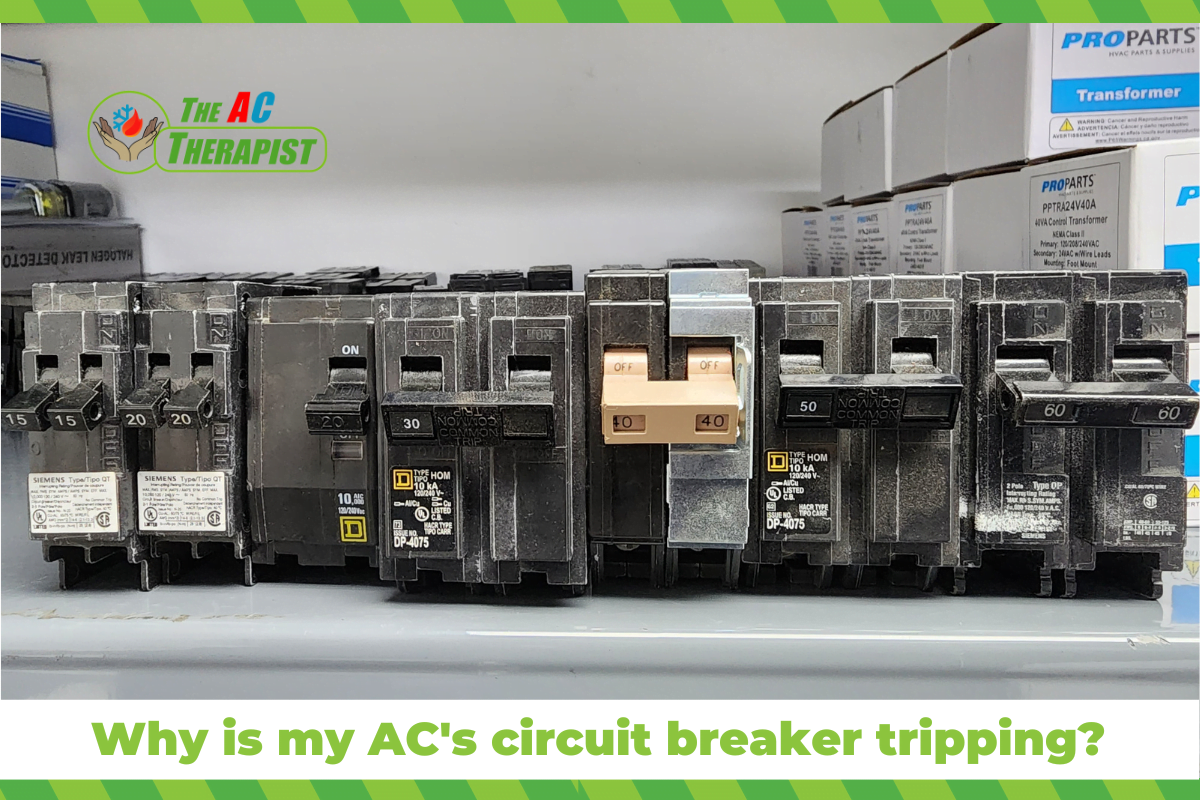
The AC Therapist
Air conditioning is an essential comfort in many homes and businesses, especially during the hot summer months . But what happens when your AC’s circuit breaker keeps tripping? This can be a frustrating and concerning issue. Below, we’ll delve into the common reasons for this problem and what you can do to fix it.
1. Overloaded Circuit
A circuit breaker’s primary function is to prevent a circuit from overloading. When the electrical demand on a circuit exceeds its capacity, the circuit breaker trips to prevent potential damage or a fire.
- Why It Happens with ACs : Air conditioners draw a significant amount of power, especially when starting up. If other high-power devices are operating on the same circuit, it can lead to overloading. Sometimes if the compressor or fan motors are faulty they can trip the breaker.
- Solution : Ensure that your AC unit is on a dedicated circuit. Consult with a local HVAC contractor like The AC Therapist to make sure your system is correctly installed and properly balanced.
2. Short Circuit
A short circuit occurs when a ‘hot’ wire touches another hot wire or a ‘neutral’ wire within your system. This creates a sudden increase in current, causing the circuit breaker to trip.
- Why It Happens with ACs : Damaged wiring, improper installation, or wear and tear can lead to short circuits in your AC system.
- Solution : Call a professional to inspect and repair any damaged wiring.
3. Ground Fault
A ground fault is a specific type of short circuit where a hot wire touches a grounded portion of your system (like the metal box).
- Why It Happens with ACs : This can happen due to aging, moisture, or damaged insulation.
- Solution : Again, this requires professional inspection and repair.
4. Faulty Circuit Breaker
Sometimes, the issue is not with the AC system itself but with the circuit breaker.
- Why It Happens : Like any other component, circuit breakers can wear out and malfunction.
- Solution : If you suspect this is the case, contact an electrician to replace the circuit breaker.
5. Dirty or Clogged Filters and Coils
Believe it or not, a dirty AC system can cause the circuit breaker to trip.
- Why It Happens with ACs : Clogged filters and coils make the AC work harder, drawing more electricity and potentially overloading the circuit.
- Solution : Regular maintenance like filter changes and coil cleaning can prevent this issue. Consider a Therapy Maintenance Plan from The AC Therapist for regular servicing.
6. Incorrectly Sized AC Unit
An AC unit that’s too big or small for the space it’s cooling can cause problems.
- Why It Happens : An incorrectly sized unit may continuously cycle on and off, leading to undue stress on the system and tripping the circuit breaker.
- Solution : Consult with an HVAC professional to ensure that your AC unit is the right size for your space.
7. Refrigerant Leaks
A refrigerant leak can cause the compressor to overheat, leading to the circuit breaker tripping.
- Why It Happens : Over time, vibrations and wear can lead to leaks in the refrigerant lines.
- Solution : Regular inspections and prompt repair of leaks by a professional can prevent this issue.
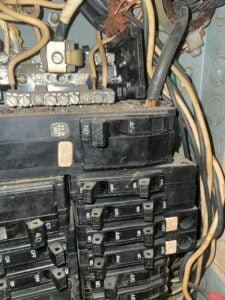
What type of breakers do AC units use?
Air conditioning units typically utilize circuit breakers that are designed to handle the specific electrical requirements of the system. Here’s an overview of the types of breakers used:
1. Double-Pole Breakers (most common in Florida)
Many central AC systems require a 240-volt circuit, which is usually controlled by a double-pole circuit breaker . These breakers are designed to handle the higher power requirements of an AC unit, and they control both the hot wires in the circuit, ensuring that the entire circuit is shut off during an overload or short circuit.
2. Ground Fault Circuit Interrupter (GFCI) Breakers
While not commonly used for central AC units, GFCI breakers are sometimes found in mini-split systems or window units, especially in damp locations. These breakers provide protection against ground faults by rapidly cutting off the power when a leakage is detected.
3. Arc Fault Circuit Interrupter (AFCI) Breakers
These are designed to prevent electrical fires by detecting an unintended electrical arc and disconnecting the power before the arc starts a fire. Though not typically used solely for AC units, they may be part of a home’s overall electrical safety system.
5. Time Delay Breakers
Air conditioners often require a significant surge of power on startup. A time delay breaker allows for a momentary spike in electrical demand (inrush current) without tripping. This type of breaker is particularly useful for systems with compressors and motors that have high startup power requirements.
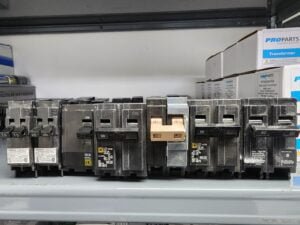
Where is my AC circuit breaker located?
The location of your AC’s circuit breaker can vary depending on the design and layout of your home or commercial building. Here’s where you might find it:
1. Main Electrical Panel
Most often, the AC’s circuit breaker is located inside the main electrical panel or circuit breaker box. This panel is typically a metal box containing various circuit breakers for different parts of the building. It might be found in the following locations:
- Garage : Many homes have the main panel located in the garage.
- Basement : If you have a basement, the panel might be located there.
- Utility Room : Sometimes, the main panel is in a utility or mechanical room.
- Exterior Wall : In some cases, especially in warmer climates like Tampa Bay, the panel may be mounted on an exterior wall of the home or building.
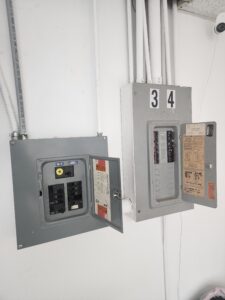
2. Subpanel
In some larger homes or commercial buildings, there may be a subpanel that handles specific areas or appliances, including the air conditioning system. This subpanel would also contain the AC’s circuit breaker.
3. Disconnect Box Near the AC Unit
In addition to the breaker inside the main panel or subpanel, there might be a disconnect box or switch located near the outdoor AC unit . This is a safety feature that allows the power to the AC unit to be shut off without accessing the main panel, usually for maintenance or repair. This box may contain a circuit breaker or simply a pull-out disconnect.
Finding the Breaker
To find the specific breaker for the AC unit:
- Check the Labels : Inside the main panel or subpanel, there should be labels next to each breaker indicating what it controls. Look for the one labeled “AC” or “Air Conditioner.”
- Consult Your Home’s Electrical Diagram : If available, this diagram will show the location of all the breakers, including the one for the AC.
- Ask a Professional : If you are unable to locate the breaker, a local HVAC contractor or electrician, like The AC Therapist in the Tampa Bay area, can help you find it.
Knowing where your AC’s circuit breaker is located is essential for troubleshooting and maintenance. If you’re ever uncertain or uncomfortable locating or handling the breaker, don’t hesitate to reach out to a professional. Safety should always be your top priority, and a qualified technician will have the knowledge and tools needed to handle the situation properly.
How to reset an AC circuit breaker?
Resetting an AC circuit breaker is usually a straightforward task that can be done without professional assistance. However, it’s essential to follow safety guidelines and understand why the breaker tripped in the first place, as resetting a breaker without resolving the underlying issue could lead to more serious problems.
Here’s a step-by-step guide to resetting your AC circuit breaker:
1. Identify the Problem (If Possible)
- Try to determine why the breaker tripped. Was there a power surge? Is there an obvious issue with the AC unit, like strange noises or smells? If the underlying problem is unknown or complex, it might be best to call a professional HVAC contractor like The AC Therapist.
2. Turn Off the AC Unit
- Switch off the thermostat controlling the AC unit.
3. Find the Breaker
- Locate the main electrical panel or subpanel where the AC circuit breaker resides.
- If there is a separate disconnect box near the outdoor AC unit , make sure to check it as well.
4. Identify the Tripped Breaker
- Look for the breaker labeled “AC” or “Air Conditioner.”
- A tripped breaker usually sits in a position between “ON” and “OFF.” It may also show a red or different-colored indicator.
5. Reset the Breaker
- Carefully switch the breaker to the “OFF” position. You might feel some resistance.
- Now, turn it back to the “ON” position.
- If there is a separate disconnect near the AC unit, ensure that it’s also in the “ON” position.
6. Turn the AC Back On
- Switch the thermostat back to its cooling mode and monitor the AC unit to make sure it’s operating correctly.
7. Call a Professional if Needed
- If the breaker trips again or if you notice any unusual behavior from the AC unit, turn everything off and call a professional HVAC contractor like The AC Therapist.
- Continuously resetting the breaker without addressing the underlying issue could lead to damage or a fire.
Safety Precautions
- Do not touch the breaker with wet hands or stand on a wet surface.
- If you feel uncomfortable or uncertain, don’t hesitate to call a professional.
Resetting an AC circuit breaker is generally a simple task, but understanding why it tripped is crucial. If the cause isn’t apparent or the problem recurs, seeking professional help from an HVAC contractor is the safest course of action. Regular maintenance, like those included in the Therapy Maintenance Plans, can prevent many issues that may lead to a tripped breaker, ensuring your system runs smoothly.
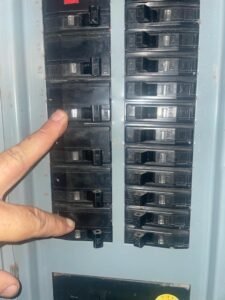
How to change an AC circuit breaker?
Changing an AC circuit breaker is a more complex task that involves working with the electrical system. While it might seem like a doable DIY project for those with some electrical knowledge, it can be risky if you’re not careful. Here’s a general guide to changing an AC circuit breaker, but please note that it’s usually best to call a licensed electrician or a skilled HVAC contractor like The AC Therapist to handle this task.
- Turn Off the Main Power : Before doing anything, turn off the main power switch to the entire electrical panel to prevent electrical shock.
- Use Insulated Tools : If you must work on the electrical panel, use insulated tools designed for electrical work.
- Wear Safety Gear : Wear safety glasses, gloves, and other necessary protective gear.
- Avoid Wet Areas : Don’t work on an electrical panel if you’re standing on a wet surface or if your hands are wet.
Steps to Change an AC Circuit Breaker
- Identify the Breaker : Determine the correct circuit breaker that needs replacement. Note the brand, type, and specifications, including the amperage.
- Purchase the Right Replacement : Go to a hardware store and purchase the exact same type of breaker. If you’re unsure, consult with an HVAC professional.
- Turn Off the Main Power : This step is crucial for safety. Make sure to turn off the main power to the entire panel.
- Remove the Panel Cover : Carefully remove the screws holding the cover of the electrical panel and set it aside.
- Remove the Old Breaker : Carefully unclip or unsnap the old breaker from the panel. Disconnect the wire from the terminal by loosening the screw holding it.
- Install the New Breaker : Connect the wire to the terminal of the new breaker and tighten the screw. Then, snap or clip the new breaker into place in the panel.
- Replace the Panel Cover : Put the cover back on the panel and replace the screws.
- Turn the Power Back On : Turn on the main power switch and then turn on the new breaker.
- Test the System : Turn on the AC to make sure everything is working correctly.
While it’s technically possible to change an AC circuit breaker yourself, the potential risks involved in working with electrical systems generally make this a job best left to professionals. An improperly installed breaker can cause electrical shock, fire, or damage to your AC system. By hiring a professional HVAC contractor, you can ensure that the right breaker is used, the installation is done correctly, and your system complies with all relevant codes and regulations. If you’re in the Tampa Bay area, The AC Therapist is equipped to handle these kinds of tasks with the right expertise and care.
How much does it cost to replace your AC circuit breaker?
If you need to replace your AC circuit breaker, The AC Therapist, a local residential and light commercial HVAC contractor in the Tampa Bay area, charges a flat fee of $250 for this service. This cost includes both the breaker itself and the labor to install it, ensuring a professional and seamless replacement.
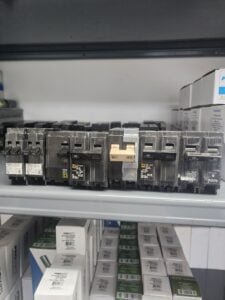
How do you test an AC circuit breaker?
Testing an AC circuit breaker is essential to ensure that it’s functioning properly and protecting your AC system from electrical overloads or shorts. Here’s a general guide on how to test an AC circuit breaker:
- Turn off the AC Unit : Before working on the breaker, make sure the AC unit is off.
- Use Insulated Tools : Always use insulated tools designed for working with electrical components.
- Avoid Wet Conditions : Do not attempt to test the breaker with wet hands or while standing on a wet surface.
Testing the AC Circuit Breaker
- Visual Inspection : First, look at the breaker to check for any obvious signs of damage, wear, or corrosion. A damaged breaker will likely need replacement.
- Use a Multimeter : A multimeter is an essential tool for testing the breaker. Set it to the voltage setting appropriate for your electrical system (usually 240V for a standard residential AC breaker).
- With the breaker in the “ON” position, place one probe on the terminal screw where the wire is connected, and the other probe on the ground or neutral bar inside the electrical panel.
- The reading should be close to the rated voltage for the breaker (e.g., 240V). If there’s no reading or a significantly lower reading, the breaker may be faulty.
- Turn off the breaker and disconnect the wire from the terminal screw.
- Turn the breaker back on, and test again between the terminal screw and the ground or neutral bar.
- If there’s no reading, the breaker itself is likely defective.
- Consider Professional Testing : If you’re unsure about the results or if the breaker seems faulty, it’s wise to call a professional HVAC contractor like The AC Therapist or a licensed electrician. They have specialized tools and knowledge to accurately assess the breaker’s condition.
Conclusion: Your Trusted Guide to AC Circuit Breakers
Your AC’s circuit breaker tripping is more than just an inconvenience; it could be a sign of a more severe underlying problem. From overloaded circuits and short circuits to dirty filters and incorrect sizing, several factors can contribute to this issue.
By understanding these common causes, you can take proactive measures to prevent them. Regular maintenance, professional inspections, and choosing the right service plan, like those offered by The AC Therapist in the Tampa Bay area, can keep your AC running smoothly and your home comfortable.
If you’re experiencing this issue, don’t hesitate to reach out to a professional HVAC contractor to diagnose and fix the problem. Regular maintenance, such as those provided in the Therapy Maintenance Plans, can also help in preventing such issues from arising in the first place. Remember, proper care and prompt attention to problems can prolong the life of your AC system and keep you cool all summer long.
You might also enjoy
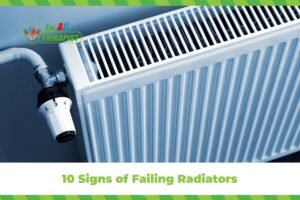
10 Signs of Failing Radiators
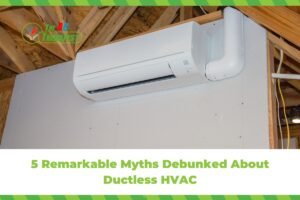
5 Remarkable Myths Debunked About Ductless HVAC
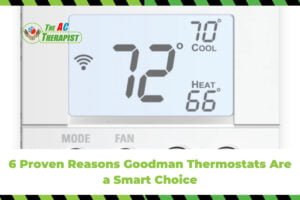
6 Proven Reasons Goodman Thermostats Are a Smart Choice

Sunrooms Cooling Solutions
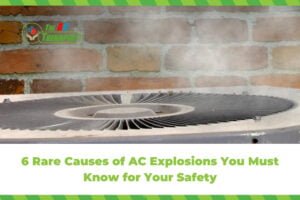
6 Rare Causes of AC Explosions You Must Know for Your Safety
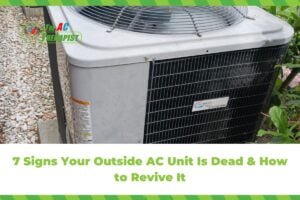
7 Signs Your Outside AC Unit Is Dead & How to Revive It

3 Perks of New Indoor AC Installation
Contact the ac therapist, convenient online scheduling available to speak with a live expert, please call our office at 813) 343-2212.

Free Estimates Available!
License #: CAC1819196
5005 W Rio Vista Ave, Tampa, FL 33634, USA
Quick Links
Home therapy maintenance plans service areas services contact us reviews, stay connected.
© 2022 All Rights Reserved
Sitemap | Privacy Policy

AC Breaker Tripped and Won’t Reset: Quick Fixes for Homeowners
The AC breaker tripped and won’t reset? Check for overloaded circuits, faulty wiring, or a malfunctioning AC unit. Turn off appliances, then reset the breaker firmly. If it persists, consult a qualified electrician.
Has your AC breaker tripped and won’t reset, leaving you in a sweltering situation? Don’t fret! In this guide, we’ll navigate through quick fixes tailored for homeowners encountering this common dilemma. When your AC breaker refuses to cooperate, understanding the root causes and implementing simple troubleshooting steps can often resolve the issue without the need for professional intervention. Stay cool and composed as we unravel the mysteries behind the AC breaker tripped and won’t reset scenario, empowering you to restore comfort to your home swiftly.
Table of Contents
Understanding the Problem
A. what causes an ac breaker to trip.
- Overloading the circuit: When the electrical load exceeds the capacity of the circuit, the breaker trips to prevent overheating and potential fire hazards.
- Electrical faults: Short circuits or ground faults can cause a sudden increase in electrical current, prompting the breaker to trip to prevent damage to appliances or wiring.
- External factors like power surges or lightning strikes: Sudden spikes in electrical current caused by external factors can trip the breaker to protect the electrical system from damage.
B. Why won’t the breaker reset?
- Potential underlying issues: There may be an ongoing problem with the electrical system, such as a persistent overload, a fault in the wiring, or a malfunctioning appliance. These issues need to be identified and resolved before attempting to reset the breaker.
- Safety mechanisms in the breaker: Breakers are designed with built-in safety features to prevent resetting if there is still a problem present. This ensures that any underlying issue is addressed before power is restored to the circuit, reducing the risk of fire or electrical hazards. If the breaker won’t reset, it may indicate that there is still a safety concern that needs to be addressed by a qualified electrician.
Safety Precautions
A. importance of safety when dealing with electrical issues:.
- Risk of Electrical Shock: Emphasize the dangers of electrical shock when dealing with AC breakers or any electrical components. Even a seemingly small issue can pose serious risks if not handled properly.
- Fire Hazard: Explain the potential for electrical fires if there are faults in the system or if components are mishandled.
- Property Damage: Highlight the possibility of damage to property, such as appliances or wiring, if electrical issues are not addressed promptly and correctly.
B. Necessary safety equipment:
- Rubber Gloves: Insulated rubber gloves are essential for protecting yourself from electrical shocks when handling breaker panels or electrical components.
- Safety Goggles: Safety goggles protect your eyes from any sparks or debris that may occur during troubleshooting or repairs.
- Insulated Tools: Use tools with insulated handles to minimize the risk of electrical shock when working on electrical systems.
- Voltage Tester: A non-contact voltage tester helps identify live circuits and ensures that power has been disconnected before beginning any work.
- Fire Extinguisher: Have a fire extinguisher readily available in case of any electrical fires that may occur during troubleshooting or repairs.
C. When to call a professional:
- Repeated Tripping: If the AC breaker continues to trip after attempting to reset it, it indicates a more serious underlying issue that may require professional diagnosis and repair.
- Visible Damage: If there is visible damage to the breaker panel, wiring, or any other electrical components, it’s best to have a professional electrician assess the situation to prevent further damage or injury.
- Lack of Experience: If you’re unsure about how to safely troubleshoot or repair electrical issues, it’s best to leave it to a qualified electrician who has the knowledge and experience to handle the job safely.
When your AC breaker trips and won’t reset, it can be a frustrating experience, especially during hot summer days. However, before calling a professional technician, there are several quick fixes you can try yourself to get your air conditioning system back up and running efficiently. In this guide, we’ll walk you through ten simple steps to troubleshoot and resolve the issue of an AC breaker that won’t reset.
Check for Overload:
The first step is to identify whether the AC breaker tripped due to an overload. An overload can occur if too many appliances are connected to the same circuit. To check for overload, unplug all devices from the affected circuit and try resetting the breaker.
Inspect the Air Filter:
A clogged air filter can restrict airflow, causing the AC unit to work harder and potentially trip the breaker. Locate the air filter in your HVAC system and inspect it for dirt and debris. If dirty, replace it with a clean filter and attempt to reset the breaker.
Clear Debris from Outdoor Unit:
Outdoor AC units can accumulate debris such as leaves, twigs, and dirt, hindering airflow and causing the system to overheat. Turn off the power to the outdoor unit, then carefully remove any debris from the surrounding area and the unit itself. Once cleared, try resetting the breaker.
Check for Refrigerant Leaks:
Low refrigerant levels can cause the AC compressor to overheat and trip the breaker. Inspect the refrigerant lines for any signs of leaks, such as hissing sounds or oily residue. If a leak is detected, contact a professional HVAC technician to repair the issue and recharge the system with refrigerant.
Inspect the Condensate Drain Line:
A clogged condensate drain line can cause water to back up into the AC system, triggering a safety mechanism that shuts off the power. Locate the condensate drain line and carefully remove any obstructions using a wet-dry vacuum or a pipe cleaner. Once cleared, attempt to reset the breaker.
Test the Capacitor:
The capacitor is responsible for providing the electrical energy needed to start the AC compressor. A faulty capacitor can prevent the compressor from starting, leading to a tripped breaker. Use a multimeter to test the capacitance of the capacitor. If it’s below the manufacturer’s specifications, replace it with a new one.
Inspect Wiring Connections:
Loose or damaged wiring connections can cause electrical shorts and tripped breakers. Turn off the power to the AC unit and carefully inspect the wiring connections at the breaker panel and the unit itself. Tighten any loose connections and repair or replace any damaged wires before attempting to reset the breaker.
Reset the Thermostat:
Sometimes, a malfunctioning thermostat can cause the AC system to behave erratically, leading to a tripped breaker. Reset the thermostat by turning it off, waiting a few minutes, and then turning it back on. Ensure that the thermostat is set to the appropriate temperature and mode before attempting to reset the breaker.
Inspect the Circuit Breaker Itself:
Over time, circuit breakers can wear out or become faulty, leading to frequent tripping. Inspect the breaker for any signs of damage, such as burns or corrosion. If the breaker appears damaged, replace it with a new one of the same amperage rating.
Call a Professional Technician:
If none of the above fixes resolve the issue of the AC breaker tripping and refusing to reset, it’s time to call a professional HVAC technician. They have the expertise and equipment to diagnose and repair complex issues with your air conditioning system safely.
In conclusion, when faced with a situation where your AC breaker has tripped and won’t reset, it’s important to approach it with caution and systematic troubleshooting. Begin by checking for any obvious issues like overheating or a faulty breaker switch. If no immediate solution presents itself, it’s best to enlist the help of a qualified electrician to diagnose and rectify the problem safely. Remember, ignoring a repeatedly tripping breaker can lead to further damage and potentially hazardous situations. By staying vigilant and addressing the issue promptly, you can ensure the continued efficiency and safety of your home’s electrical system.
Similar Posts
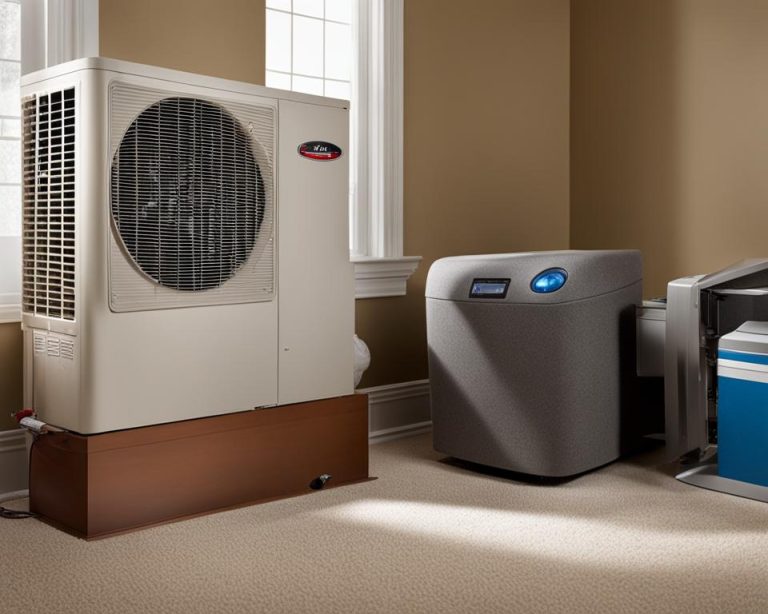
AC Not Blowing Hard: Uncover Reasons and Solutions!
To address the issue of AC not blowing hard, check and replace the air filter, as a…
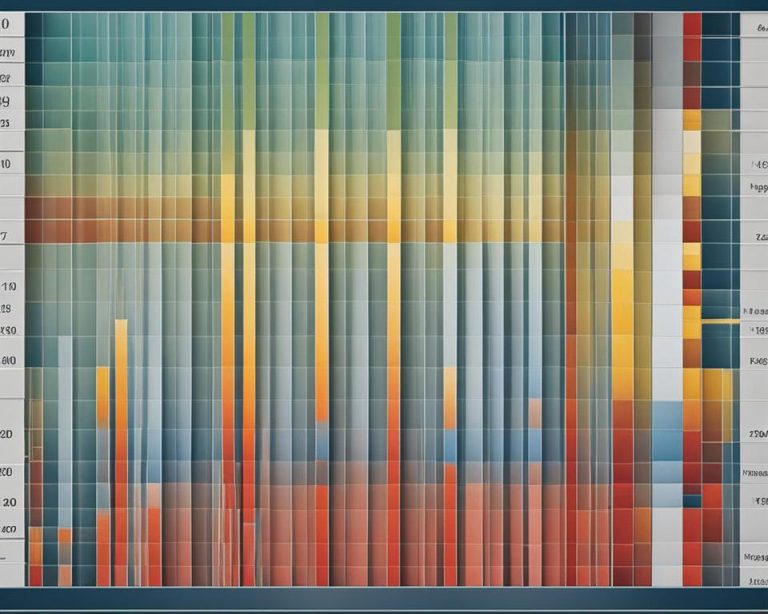
How Often AC Maintenance is Required
To ensure optimal performance and energy efficiency, AC maintenance should be conducted annually by a professional technician….
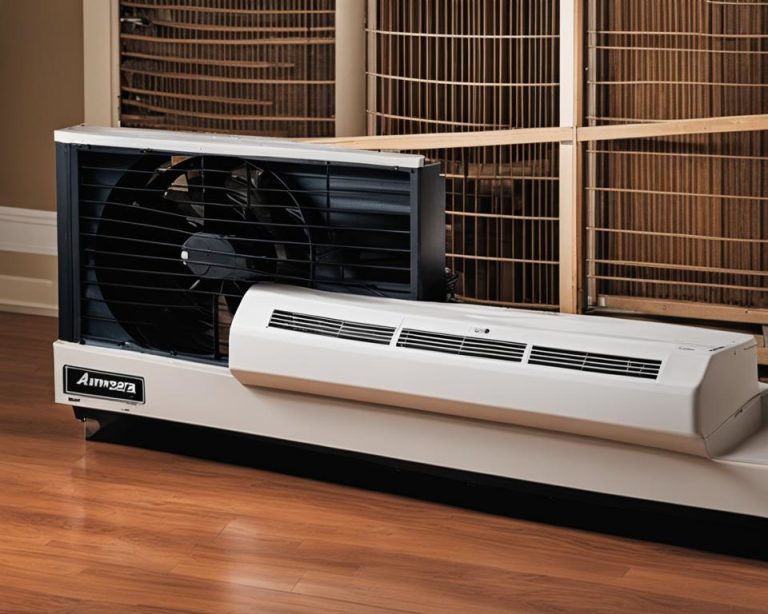
Amana PTAC Fan Not Working: Quick Fixes Here!
To address Amana PTAC Fan Not Working, check the thermostat settings, ensure the unit is receiving power,…
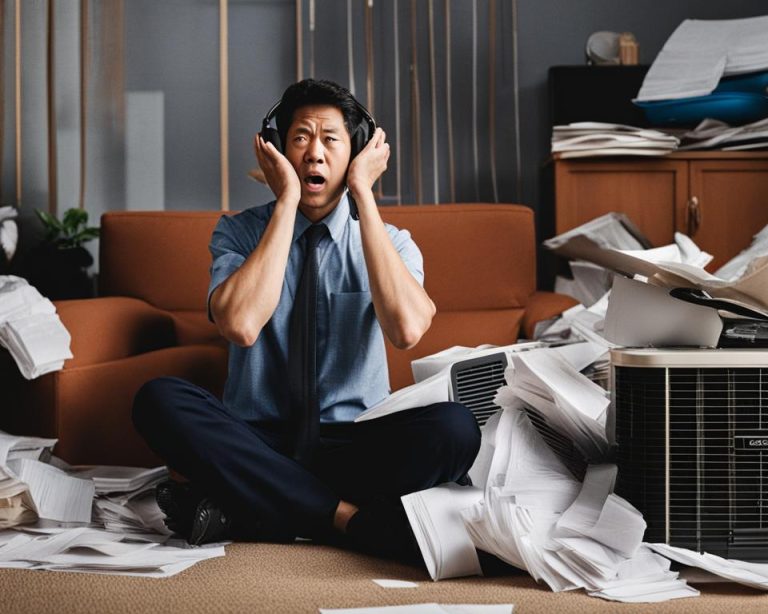
Toshiba Portable Air Conditioner Keeps Beeping: DIY Fix
To troubleshoot a Toshiba Portable Air Conditioner beeping issue, check the user manual for error codes. Clean…
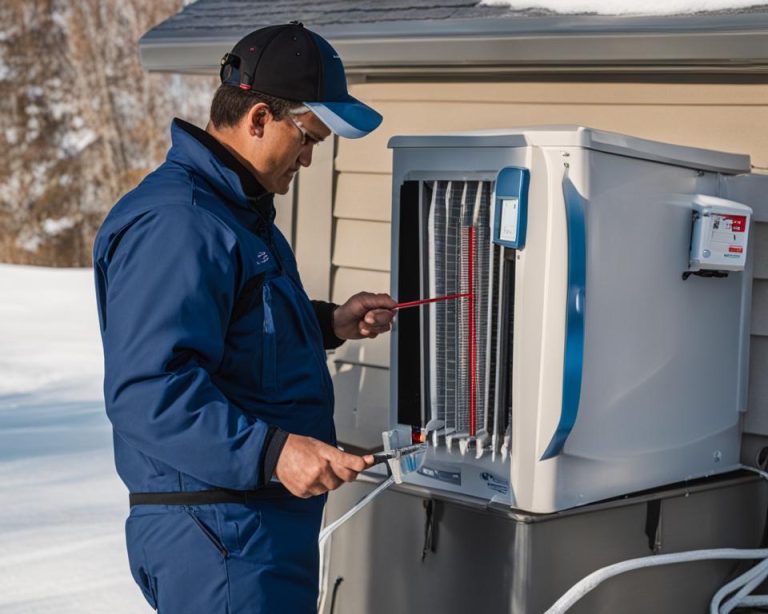
Amana PTAC Not Blowing Cold Air: Quick Fixes
To address Amana PTAC not blowing cold air, check the thermostat settings to ensure it’s on cooling…
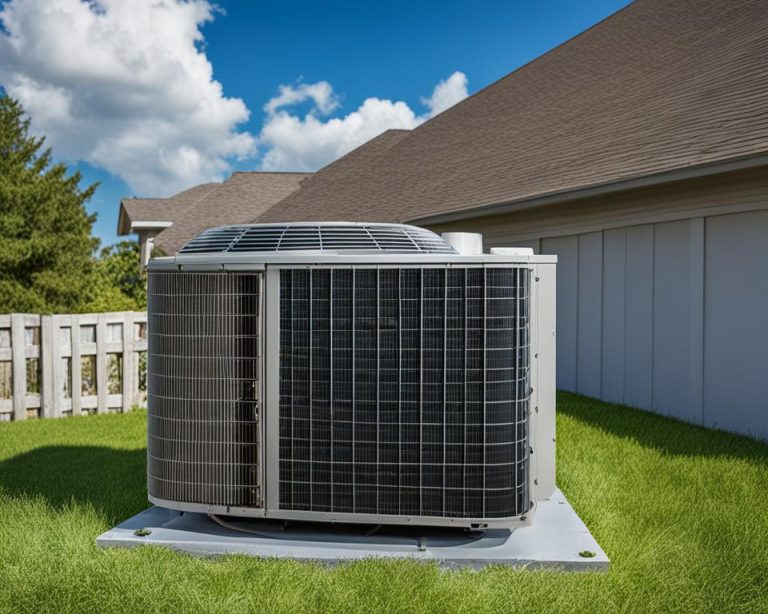
AC Condensate Pump Not Working: Don’t Panic, Try This!
To fix an AC condensate pump not working, check the power supply, examine the float switch for…
20 Comments
- Pingback: Arctic King Air Conditioner Control Panel Not Working: DIY Repair Guide
- Pingback: Danby Air Conditioner Keeps Tripping Breaker: Quick DIY Solutions
- Pingback: Amana PTAC Not Cooling: Discover Quick Fixes Now!
- Pingback: Dometic AC Compressor Running But Not Cooling: Quick Fix!
- Pingback: Bryant AC Thermostat Not Working: Fix It Now!
- Pingback: Amana PTAC Not Blowing Cold Air: Quick Fixes
- Pingback: American Standard AC Fan Not Working: Fix It Now!
- Pingback: Amana AC Fan Not Working: Troubleshoot with Quick Fixes!
- Pingback: How to Fix a Loose Electrical Connection: Quick DIY Solutions
- Pingback: Goodman Ac Unit Fan Not Spinning: Troubleshooting Tips
- Pingback: Why Is My AC Beeping? Troubleshoot the Annoying Signals Now!
- Pingback: GE Air Conditioner Keeps Beeping: Troubleshooting Problems
- Pingback: Amana PTAC Troubleshooting Problems: A Comprehensive Guide
- Pingback: Amana Air Conditioner Troubleshooting Problems
- Pingback: Common AC Problems and Solutions: Based on Specific Issues
- Pingback: American Standard AC Not Cooling: Quick Fixes Here!
- Pingback: American Standard AC Compressor Not Turning On: Quick Fix
- Pingback: Goodman AC Not Blowing Cold Air: Troubleshoot Like a Pro!
- Pingback: American Standard AC Troubleshooting Problems: Quick Fixes!
- Pingback: Daikin AC Swing Not Working: Quick Fixes
Leave a Reply Cancel reply
Your email address will not be published. Required fields are marked *
Save my name, email, and website in this browser for the next time I comment.

Why Is My Ac Breaker Tripping? Troubleshooting Tips And Solutions
Your AC breaker may be tripping due to a variety of reasons. Here are some common causes: 1. Overload: If your AC is drawing too much current, it can trip the breaker. 2. Short circuit: A short circuit in the AC unit’s wiring can also cause the breaker to trip. 3. Dirty air filter: A clogged air filter can overwork the AC, leading to breaker trips. 4. Faulty compressor: A malfunctioning compressor can cause electrical issues and trip the breaker. 5. Low refrigerant: Insufficient refrigerant levels can cause the AC to work harder and trip the breaker. It’s important to address the underlying issue to prevent further breaker trips. Consult a professional if needed.
Imagine this scenario: it’s the middle of a scorching summer day, and you’re seeking refuge in the cool oasis of your air-conditioned home. But just as you start to relax, you hear a sharp click, and suddenly, your AC shuts off.
Frustrated, you head to the electrical panel, only to find that the circuit breaker for your air conditioner has tripped yet again. What could be causing this recurring issue? And more importantly, how can you fix it without breaking the bank? If you’ve ever found yourself in this situation, you’re not alone.
AC breaker tripping is a common problem that homeowners and renters face, and it can be both perplexing and inconvenient. But fear not, because in this article, we will dive into the world of troubleshooting tips and solutions to help you understand why your AC breaker keeps tripping and how you can resolve the issue. In the following sections, we’ll explore the potential causes behind this frustrating problem, ranging from simple fixes to more complex electrical issues.
By the end, you’ll be equipped with the knowledge and confidence to tackle AC breaker tripping head-on, ensuring a comfortable and uninterrupted cooling experience throughout the summer. So let’s get started and uncover the secrets to keeping your AC breaker in check.
Table of Contents
I. Understanding the AC Breaker
A. introduction to the ac breaker.
Before we delve into the causes and solutions for AC breaker tripping, it’s essential to understand the role of the AC breaker in your home’s electrical system. The AC breaker, also known as the air conditioner circuit breaker, is a safety device that protects your AC system from electrical overloads and faults.
B. Importance of the AC breaker in protecting the system
The AC breaker plays a crucial role in safeguarding your air conditioner and preventing potential hazards. If there is an electrical fault or excessive current flow, the breaker will trip, cutting off power to the AC system and preventing further damage or potential fire hazards.
C. Explanation of how the AC breaker works
The AC breaker works based on the principle of thermal-magnetic tripping. It consists of a thermal component and a magnetic component. The thermal component detects excess heat due to overcurrent and trips the breaker, while the magnetic component detects sudden surge or short circuits and promptly trips to protect the system.
II. Common Causes of AC Breaker Tripping
A. electrical overload, 1. definition of electrical overload.
Electrical overload occurs when the electrical circuit is carrying more current than it can handle. It is often the result of connecting too many electrical devices or appliances to a single circuit.
2. Identification of signs of electrical overload
Signs of electrical overload may include flickering lights, buzzing sounds, frequently tripping breakers, or warm electrical outlets.
3. Solutions for preventing electrical overload
To prevent electrical overload, distribute the electrical load evenly across circuits, avoid using power strips or extension cords for high-power devices, and consider upgrading your electrical panel if necessary.
B. Short Circuit
1. definition of short circuit.
A short circuit occurs when a hot wire comes into direct contact with a neutral wire or a ground wire, causing a sudden surge of current and tripping the breaker.
2. Signs of a short circuit in the AC system
Signs of a short circuit may include sparks or smoke coming from outlets, a burning smell, or a breaker that tripped immediately after turning on the AC.
3. Steps to diagnose and fix a short circuit
To diagnose a short circuit, visually inspect the wiring for any signs of damage or exposed wires. If a short circuit is identified, it’s best to seek professional help to safely repair or replace the affected wiring.
C. Ground Fault
1. definition of ground fault.
A ground fault occurs when a hot wire comes into contact with a ground wire or a metal electrical box, diverting current away from its intended path and tripping the breaker.
2. Identifying signs of ground faults in the AC system
Signs of ground faults may include tingling sensations when touching appliances, shocks when touching metal parts, or breakers tripping when specific appliances are turned on.
3. Troubleshooting steps for resolving ground faults
To troubleshoot ground faults, inspect the AC system for damaged or exposed wiring and ensure all connections are secure. If the issue persists, it’s recommended to consult a professional electrician for further assistance.
D. Overheating
1. causes of ac overheating.
AC overheating can occur due to various reasons, including clogged air filters, dirty condenser coils, refrigerant leaks, or mechanical issues with the AC unit.
2. Signs of an overheated AC system
Signs of an overheated AC system may include inadequate cooling, unusual sounds, frozen coils, or a breaker that trips when the AC is running for an extended period.
3. Solutions for preventing AC overheating
To prevent AC overheating, ensure regular maintenance, clean or replace air filters regularly, clean condenser coils, and promptly address any mechanical issues or refrigerant leaks.
E. Faulty Breaker
1. indicators of a faulty ac breaker.
Indicators of a faulty AC breaker may include frequent tripping, the breaker not staying in the “on” position, or physical damage to the breaker.
2. Steps to test and replace a faulty breaker
To test a faulty breaker, you can use a multimeter to check for continuity. If the breaker is confirmed faulty, it’s crucial to seek professional assistance for replacement to ensure proper installation and safety.
3. Importance of professional assistance for breaker replacement
Replacing a breaker requires technical expertise to ensure compatibility and proper installation. It’s highly recommended to hire a licensed electrician to handle breaker replacements and avoid any potential hazards.
III. Troubleshooting AC Breaker Tripping
A. step-by-step guide to troubleshoot ac breaker tripping, 1. initial checks and observations.
Start troubleshooting by checking for any obvious signs of electrical issues, such as burning smells, unusual noises, or visible damage to the AC unit or wiring.
2. Isolating the issue
Next, turn off all the breakers except for the one that controls the AC. If the breaker trips immediately, it indicates a problem within the AC system. If it doesn’t trip, gradually turn on the other breakers to identify any conflicting circuits.
3. Narrowing down the possible causes
Inspect the AC unit, wiring, and electrical connections for any signs of damage, loose connections, or worn-out components. Pay attention to specific areas identified during the troubleshooting process.
4. Testing and inspecting components
Use a multimeter to test electrical components such as capacitors, contactors, and motors. Ensure proper voltage readings and check for any abnormalities or signs of failure.
B. DIY vs. Professional Assistance
1. when to attempt diy troubleshooting.
DIY troubleshooting is appropriate for simple tasks such as checking the air filter, cleaning the condenser coils, or resetting the breaker. However, exercise caution and prioritize safety when dealing with electrical components.
2. Risks of DIY repairs
DIY repairs without proper knowledge or training can lead to personal injury, further damage to the AC system, or compromised electrical safety. It’s crucial to know your limits and seek professional help when needed.
3. Benefits of hiring a professional technician
Hiring a professional technician offers several benefits, including expertise in diagnosing and resolving complex AC issues, ensuring compliance with safety regulations, and providing warranty coverage for repairs or replacements.
C. Preventive Maintenance
1. the importance of regular ac maintenance.
Regular AC maintenance is essential to prevent breakdowns, improve energy efficiency, prolong the lifespan of the unit, and detect potential issues before they escalate.
2. Key maintenance tasks to prevent breaker tripping
Key maintenance tasks include cleaning or replacing air filters, clearing debris around the outdoor unit, checking refrigerant levels, lubricating moving parts, and scheduling professional inspections.
3. Scheduling professional maintenance services
To ensure comprehensive maintenance, it’s advisable to schedule professional maintenance services at least once a year. Professional technicians can perform thorough inspections, tune-ups, and identify any underlying issues.
IV. Additional Considerations
A. upgrading electrical panel, 1. reasons for upgrading the electrical panel.
Upgrading the electrical panel may be necessary if the existing panel is outdated, unable to handle increased power demand, or experiencing frequent breaker tripping.
2. Benefits of an upgraded panel
An upgraded panel provides increased electrical capacity, improved safety features, compatibility with modern appliances, and a reduced risk of electrical issues or breaker tripping.
3. Professional installation guidance
Consulting a licensed electrician is essential for upgrading the electrical panel. They can assess your power requirements, recommend suitable options, and ensure proper installation and compliance with local electrical codes.
B. Safety Precautions
1. importance of electrical safety.
Electrical safety is paramount to prevent electrical shocks, fires, or injuries. Taking necessary precautions while dealing with the AC breaker or any electrical components is vital.
2. Safety measures to follow when dealing with the AC breaker
Some safety measures include turning off the main power before working on the breaker, using insulated tools, avoiding wet conditions, and wearing protective gear.
3. Electrical safety tips for homeowners
Homeowners can promote electrical safety by not overloading circuits, using surge protectors, regularly inspecting outlets and cords for damage, and keeping electrical equipment away from water sources.
C. Troubleshooting Tips for Specific Scenarios
1. ac breaker tripping during startup.
During AC startup, a momentary surge in current is normal. However, if the breaker trips repeatedly during startup, it may indicate issues with the compressor, motor, or wiring.
2. AC breaker tripping during high load conditions
If the breaker trips when the AC is running at full capacity, it suggests excessive electrical load or an underlying issue with the AC system. Consider redistributing the load or consulting a professional technician.
3. AC breaker tripping in extreme weather conditions
In extreme weather conditions, such as hot summers or severe storms, AC breakers may trip due to increased electrical demand or power fluctuations. Ensure the AC unit is well-maintained and stable power supply is available.
D. Monitoring and Regular Inspections
1. regular inspection checklist for the ac system.
Regular inspections should include checking electrical connections, measuring temperature differentials, testing capacitors, lubricating moving parts, inspecting refrigerant levels, and cleaning coils.
2. Warning signs that require immediate attention
Warning signs that warrant immediate attention include burning smells, unusual sounds, frequent breaker tripping, inadequate cooling, or any visible damage to the AC unit or wiring.
3. Benefits of tracking and monitoring breaker behavior
Tracking and monitoring breaker behavior can help identify recurring issues, detect patterns of breaker tripping, and provide valuable insights for preventive maintenance or necessary repairs.
V. Conclusion
In conclusion, AC breaker tripping can be caused by various factors, including electrical overload, short circuits, ground faults, overheating, or faulty breakers. By understanding these common causes and following the troubleshooting tips provided, you can address the issue effectively and restore the optimal functioning of your AC system.
Remember, safety should always be the top priority when dealing with electrical components. When in doubt, it’s best to seek professional assistance to ensure proper diagnosis, repair, and maintenance. With regular preventive care and attention to electrical safety, you can enjoy uninterrupted cooling comfort and peace of mind throughout the year.
AC Unit Not Turning On – How to Fix It
Frequently Asked Questions (FAQ)
Why is my ac breaker tripping, how can i prevent my ac breaker from tripping, is it safe to keep resetting the ac breaker, can i fix a tripping ac breaker myself, how much does it cost to fix a tripping ac breaker, final words: understanding and preventing ac breaker tripping.
In conclusion, understanding why your AC breaker is tripping is crucial in maintaining the safety and functionality of your air conditioning system. The AC breaker plays a vital role in protecting your AC system from electrical overloads and faults, ensuring the safety of your home.
Common causes of AC breaker tripping include electrical overload, short circuits, ground faults, overheating, and faulty breakers. By identifying these causes and implementing the appropriate solutions, you can prevent further damage to your AC system and potential hazards such as electrical fires.
Troubleshooting AC breaker tripping involves a step-by-step process of checking for signs of damage, isolating the issue, narrowing down possible causes, and testing and inspecting components. It is important to exercise caution and prioritize safety when dealing with electrical components, and seek professional assistance when needed. Preventive maintenance is key in preventing AC breaker tripping.
Regularly cleaning or replacing air filters, clearing debris around the outdoor unit, and scheduling professional inspections can help detect and address potential issues before they escalate. It is also important to consider upgrading your electrical panel if it is outdated or experiencing frequent breaker tripping. An upgraded panel provides increased electrical capacity and improved safety features, reducing the risk of electrical issues.
Hello, I'm John C. Madison, your HVAC guru at Smart AC Fix. With over 20 years of experience as a certified HVAC technician, I've spent years diving into the intricate world of heating, ventilation, and air conditioning systems. My passion for understanding how things work drove me to master the art of AC maintenance and repair. I'm here to share practical, hands-on solutions to your AC problems and help you keep your cooling system running smoothly. From troubleshooting to maintenance tips, count on me for expert advice. When I'm not tinkering with AC units, you'll find me enjoying the great outdoors and staying cool, just like I want for you!
Similar Posts
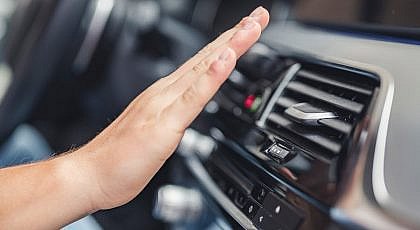
Why Does My Ac Only Work When I’M Driving? Unveiling The Mystery
The air conditioning in a car may only work when the car is in motion due to several potential reasons: 1….
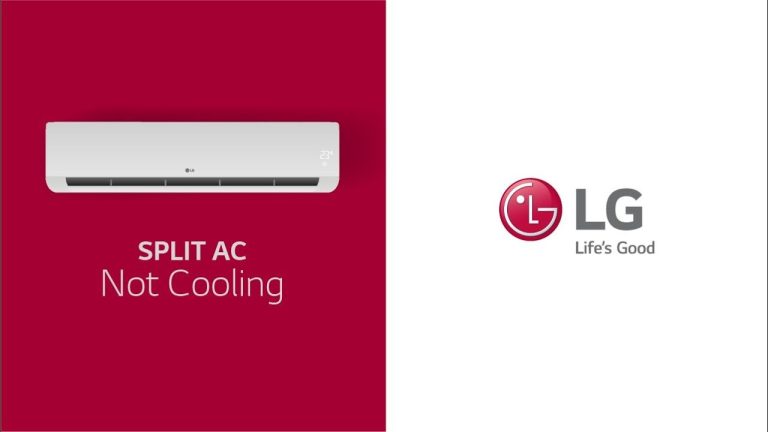
New Lg Dual Inverter Ac Not Cooling? Discover Expert Solutions Now!
If your new LG Dual Inverter AC is not cooling efficiently, there are expert solutions to address the issue. Whether it’s…
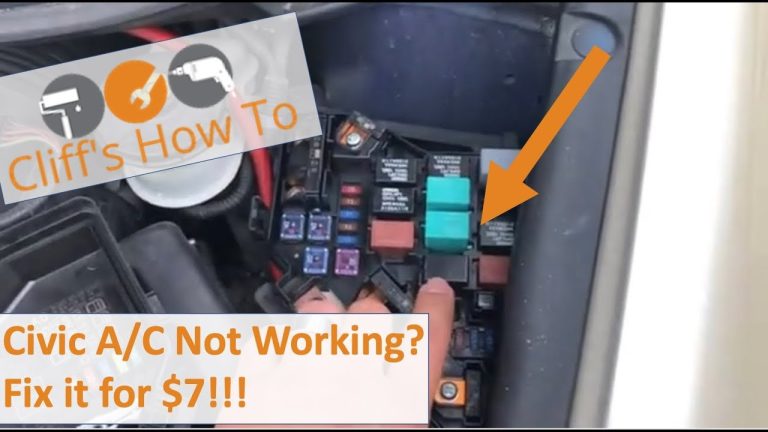
2006 Honda Civic Ac Compressor: Why It’S Not Engaging And How To Fix It
The 2006 Honda Civic AC compressor is not engaging, causing the AC to blow hot air. This is a common issue…
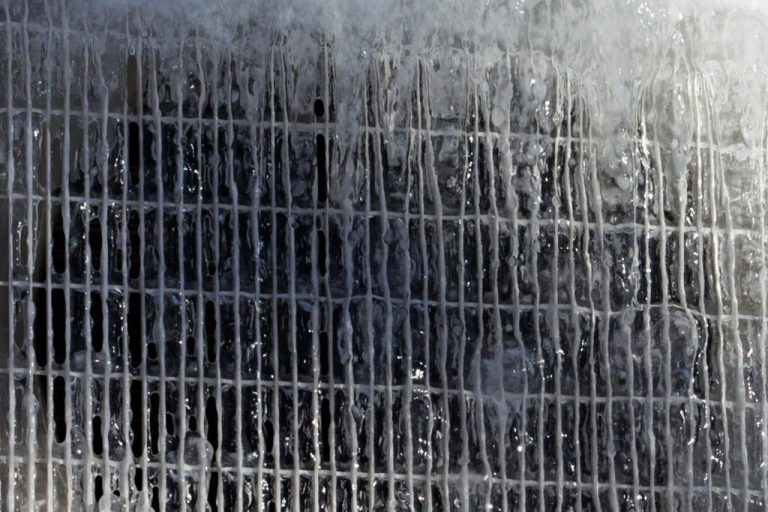
How Long Does It Take To Defrost Ac Coils? Discover The Quick And Effective Methods
It typically takes 4-6 hours for AC coils to defrost, but the exact time can vary depending on factors such as…
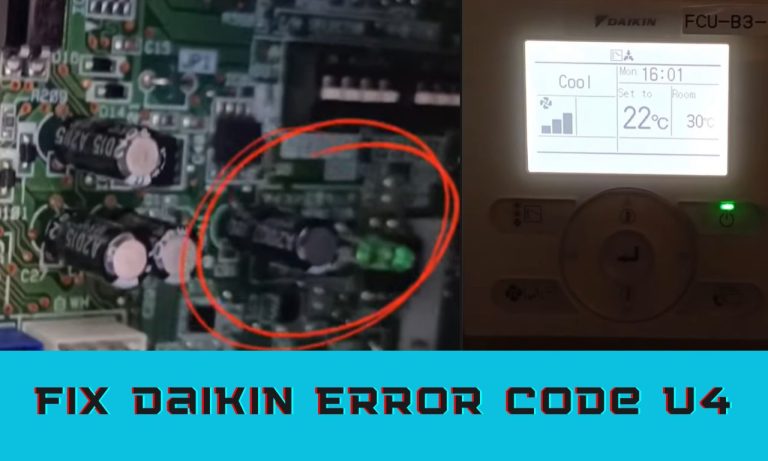
Daikin Error Code U4: Troubleshooting Guide For Quick Solutions
Daikin’s U4 error indicates a communication glitch between indoor and outdoor units, often triggered by power disruptions in the outdoor unit…
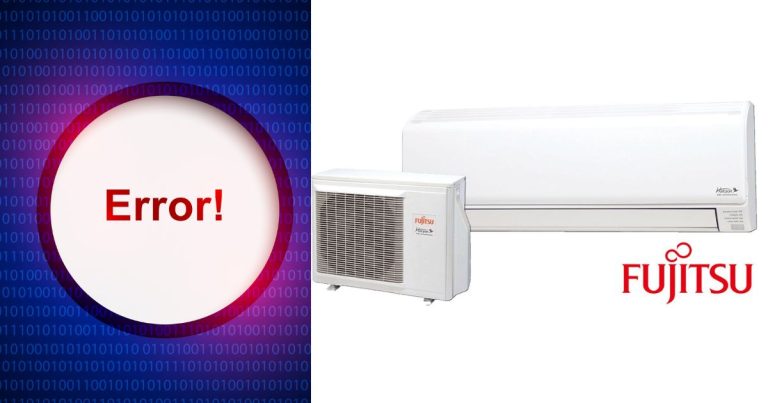
Fujitsu Mini Split Error Codes: Troubleshooting Guide And Solutions
Fujitsu mini split air conditioning systems can encounter error codes that may cause confusion. This guide provides a comprehensive troubleshooting guide…
Leave a Reply Cancel reply
Your email address will not be published. Required fields are marked *
Save my name, email, and website in this browser for the next time I comment.
- Skip to main content
- Skip to primary sidebar
- Skip to footer
Safe Home Advice
Tips to make your home safe
Troubleshooting: Why Is My Ac Tripping The Breaker?
Is your air conditioner constantly tripping the breaker? Don’t worry, we’ve got the solution for you! Many homeowners often encounter this frustrating issue, and it can certainly put a damper on your indoor comfort. So, why is your air conditioner tripping the breaker? Well, there are a few possible culprits causing this problem, but rest assured, we’re here to help you troubleshoot and overcome the challenge. Let’s dive in and explore what might be causing your air conditioner to trip the breaker, shall we?
Table of Contents
Why Is My Air Conditioner Tripping the Breaker?
If you’ve experienced the frustration of your air conditioner consistently tripping the breaker, you’re not alone. This common issue can be caused by several factors, ranging from simple to more complex issues. Understanding why your air conditioner is tripping the breaker is essential to resolving the problem and ensuring your cooling system functions smoothly. In this article, we’ll explore the potential causes of this issue and provide helpful solutions.
1. Electrical Overload
One of the most common reasons for an air conditioner tripping the breaker is an electrical overload. When the demand for power exceeds the capacity of the circuit, the breaker trips to prevent damage to the system. Here are a few possible causes of an electrical overload:
A. Dirty Air Filters:
Air filters play a crucial role in maintaining proper airflow in your air conditioning system. When they become dirty or clogged, the system must work harder to circulate air, leading to increased energy consumption and potentially overloading the electrical circuit. Regularly cleaning or replacing your air filters can prevent this issue.
B. Blocked or Restricted Air Vents:
Similarly, blocked or restricted air vents can disrupt the airflow and cause your air conditioner to work harder than necessary. This added strain on the system may result in an electrical overload. Make sure all vents are clear and unobstructed to promote optimal airflow.
C. Undersized Breaker:
In some cases, the circuit breaker may be undersized for the electrical load required by your air conditioner. This can cause the breaker to trip frequently. Consulting with a professional electrician to evaluate and potentially upgrade your breaker’s capacity can help alleviate this issue.
2. Compressor Issues
The compressor is the heart of your air conditioning system, responsible for pumping refrigerant and maintaining the desired temperature. If there are issues with the compressor, it can lead to a tripped breaker. Here are a couple of possibilities:
A. Dirty or Damaged Compressor:
A dirty or damaged compressor can cause it to overheat, resulting in excessive power consumption and a tripped breaker. Regular maintenance, such as cleaning the coils and ensuring proper lubrication, can help prevent these problems. If the compressor is damaged, it may require professional repair or replacement.
B. Faulty Capacitor:
The capacitor is a component that helps start the compressor motor. If the capacitor is faulty or failing, it can cause the compressor to draw excessive power and trip the breaker. A qualified HVAC technician can diagnose and replace a faulty capacitor.
3. Wiring Issues
Problems with the electrical wiring in your air conditioning system can also lead to breaker tripping. Check for the following potential wiring issues:
A. Short Circuits:
Short circuits occur when wires come into contact with each other or with other conductive materials. This can cause a surge of electricity, resulting in a tripped breaker. A professional electrician should be consulted to identify and resolve any short-circuiting wiring.
B. Loose Connections:
Loose electrical connections can disrupt the flow of electricity and cause overheating, which may trip the breaker. It’s important to ensure all connections are secure and properly tightened. If you’re not familiar with electrical work, it’s best to seek assistance from a qualified professional.
4. Insufficient Cooling System Maintenance
Regular maintenance is crucial for the efficient operation of your air conditioner. Neglecting routine maintenance tasks can lead to various issues that may cause the breaker to trip. Consider the following maintenance-related factors:
A. Dirty Condenser Coils:
Condenser coils located outside your home can accumulate dirt, debris, and grime over time, hindering proper heat transfer. When the coils are dirty, the system works harder and may overload the circuit, causing the breaker to trip. Cleaning the condenser coils periodically can prevent this problem.
B. Low Refrigerant Levels:
Insufficient refrigerant levels can cause the air conditioner to work harder and longer, potentially leading to an electrical overload. If you suspect low refrigerant levels, it’s best to have a professional HVAC technician inspect and recharge the system as needed.
C. Aging or Faulty Components:
As your air conditioner ages, its components may deteriorate or become faulty. This can lead to increased energy consumption and potential breaker tripping. Regular inspections by an experienced HVAC technician can help identify and address any aging or faulty components.
5. Extreme Weather Conditions
During periods of excessive heat or cold, the demand for cooling or heating increases, which can overload the air conditioning system and cause the breaker to trip. Here are a few considerations related to extreme weather conditions:
A. Heatwaves:
Heatwaves result in higher temperatures outside, causing your air conditioner to run for more extended periods. In such conditions, the system may become overloaded and cause the breaker to trip. Ensuring your air conditioner is adequately sized for the cooling load of your home can help mitigate this issue.
B. Cold Snaps:
Similarly, during extremely cold weather, heating systems may need to work harder to maintain comfortable indoor temperatures. This increased workload can overload the system, resulting in a tripped breaker. Regular maintenance and ensuring proper insulation can help prevent this issue.
Understanding the reasons behind your air conditioner tripping the breaker is crucial to finding the appropriate solutions. From electrical overloads to compressor issues, wiring problems, insufficient maintenance, and extreme weather conditions, there are several potential culprits. By addressing these issues promptly and seeking professional help when necessary, you can ensure your air conditioner operates efficiently and reliably, keeping you cool during hot summer months. Remember, safety should always be a priority, and if you’re unsure about any electrical or HVAC-related repairs, it’s best to consult with a qualified technician. Stay proactive, and you’ll enjoy uninterrupted cooling for years to come.
Frequently Asked Questions
Why is my air conditioner tripping the breaker.
Air conditioners can trip the breaker for a variety of reasons, ranging from electrical issues to internal problems. Here are some common questions and answers to help you understand why your air conditioner might be causing your breaker to trip.
Does an overloaded circuit cause my air conditioner to trip the breaker?
An overloaded circuit is a common cause of air conditioner breaker trips. When an air conditioner demands more electricity than a circuit can handle, it can cause the breaker to trip as a safety mechanism. To avoid this, make sure your air conditioner is on a dedicated circuit and not sharing it with other high-powered appliances.
Can a faulty capacitor lead to my air conditioner tripping the breaker?
Yes, a faulty capacitor in your air conditioner can cause the breaker to trip. The capacitor is responsible for storing and releasing electrical energy to start the compressor. If it becomes weak or fails, it can cause an electrical imbalance that triggers the breaker. A professional HVAC technician can diagnose and replace a faulty capacitor if needed.
Could a refrigerant leak be the reason my air conditioner is tripping the breaker?
While a refrigerant leak itself may not directly cause the breaker to trip, it can contribute to the problem. When refrigerant levels are low, the compressor has to work harder, putting additional strain on the electrical system. This increased load can lead to the breaker tripping. If you suspect a refrigerant leak, it’s best to call a professional to inspect and repair it.
Can a dirty air filter cause my air conditioner to trip the breaker?
Yes, a clogged or dirty air filter can restrict airflow and cause your air conditioner to work harder than necessary. This increased strain on the system can result in the breaker tripping. Regularly cleaning or replacing your air filter can help prevent this issue and keep your air conditioner running smoothly.
What role does the compressor play in my air conditioner tripping the breaker?
The compressor is a vital component of an air conditioner, responsible for compressing refrigerant and circulating it through the system. If the compressor is malfunctioning or experiencing electrical issues, it can draw excessive power, causing the breaker to trip. A professional inspection can determine if the compressor needs repair or replacement.
Final Thoughts
If your air conditioner keeps tripping the breaker, there may be a few reasons behind this issue. Firstly, it could be due to an overloaded circuit. To resolve this, consider unplugging any unnecessary appliances or devices connected to the same circuit. Secondly, a faulty thermostat or compressor could be causing the problem. In such cases, it’s best to seek professional assistance to diagnose and fix the issue. Finally, a dirty air filter or condenser coils can also lead to the AC tripping the breaker. Regularly cleaning and maintaining these components can help prevent this problem. Don’t ignore the signs – if your air conditioner keeps tripping the breaker, it’s time to take action and ensure your AC functions efficiently.
Reader Interactions
Leave a reply cancel reply.
Your email address will not be published. Required fields are marked *
Save my name, email, and website in this browser for the next time I comment.
Notify me of follow-up comments by email.
Notify me of new posts by email.
- Home Appliances
Quick Pages!
- Affiliate Disclosure
- Privacy Policy
- Terms and Conditions
- Write for Us
- Specials & Rebates
- Thermostats
- Our Service Area

Why Does My Central Air Conditioner Keep Tripping the Breaker?
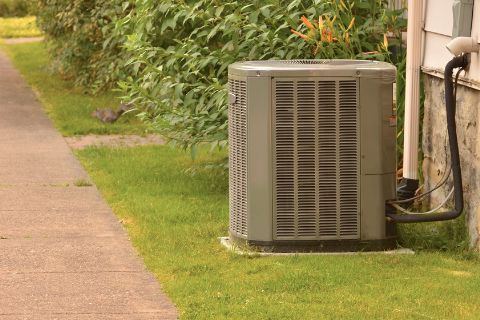
The last thing you want on a sweltering summer day is to have your air conditioner keep turning off because the circuit breaker keeps tripping. Your home’s circuit breaker is a safety measure that protects against damage from overloaded circuits, which could cause a fire. Your AC constantly tripping your circuit breaker means that it’s pulling in too many amps than the breaker was designed for.
This is a problem that you definitely need to address before it gets worse. Don’t just keep resetting the circuit breaker. You need to see an AC repair specialist immediately in order to prevent further damage and potentially dangerous situations.
The first thing you should do if you’ve noticed a problem with your AC circuit breaker is to make sure there really is a problem. If there was a recent storm or power outage, the circuit breaker might’ve been tripped in a one-time power surge.
However, if the problem has happened more than once, it’s likely an issue with your AC system. You might be able to simply reset your air conditioner’s internal circuit breaker. Take the following steps to do so:
- Turn the AC system OFF (on the thermostats)
- Reset the AC circuit breaker switch in your electrical panel to ON
- Wait 30 minutes with the air conditioner OFF
- Set your air conditioner back to COOL
If everything works as it should after this reset, you’re good to go! However, if the AC circuit breaker immediately trips again, or if it won’t turn on at all, you likely have a problem that needs to be looked at by a professional. If the AC system works for a little while before turning back off, there might be something you can do to fix it.
Call Your Trusted Toronto HVAC Professional
Your air conditioning system is a large investment, one you don’t want to risk by accidentally breaking something even further in an attempt to fix it yourself. While there are many maintenance tasks that are easily accomplished by homeowners, an electrical issue is something best left to an AC technician with the knowledge, skills, and qualifications to handle it.
If you’re unsure of what the cause might be, the best way to ensure peace of mind is to contact your local HVAC technician for AC repair . A certified technician will be able to walk you through any possibilities, help you troubleshoot, and determine if the issue is something minor that you can fix yourself, or if it will need to be professionally serviced.
8 Reasons Your Central Air Conditioner Keeps Tripping the Breaker
1. dirty condenser coils.
If you’ve been neglecting your yearly AC unit maintenance, you might’ve noticed that your home isn’t as cool as it should be. Dirty condenser coils might be the issue, and luckily it’s one with an easy fix.
When your condenser coils get dirty, they lose their ability to disperse heat. This can lead to the air conditioner overheating, which may be the cause of tripping the circuit breaker.
Dirty coils are usually caused by a buildup of dust and debris on the outdoor unit. Make sure you’re doing your yearly cleaning—and scheduling regular tune-ups—to keep the condenser coils in good condition.
2. Dirty Air Filter

Dirty filters may cause your air conditioner to trip the circuit breaker. Reduced airflow means the fan motor must work harder and longer to draw air through the filter. This can draw too much electricity, causing the air conditioning unit to overheat and resulting in an electrical short.
If you’ve noticed puddles of water around your outside AC unit or there’s no cool air coming from your AC , it might indicate restricted air circulation, which might be the cause for why your breaker keeps tripping. The easiest fix for this is to change the dirty air filter. Air filters should be cleaned and changed regularly , depending on how often you use your AC.
3. Old Air Conditioner
Nothing lasts forever, and your air conditioner is no exception. If your system is over 10 years old, it’s probably nearing the end of its useful life. The time will come when the cost of extensive repairs to keep an older unit running is more than it would cost to replace it with a new AC unit .
Older units will show signs of failure before they break for good. If the air conditioner’s circuit breaker tripping is only one of many issues you’re seeing, it’s time to consider replacing your unit.
4. Faulty Fan
Your AC system uses fans to help move air around, blowing over the coils to release the heat from your inside unit. If the motors that run these fans are damaged or dirty, your AC system will be using more energy, which might be the cause of your AC breaker trips.
If the fan blades are coated in dust and debris and slowing down the fan, a thorough cleaning might be enough to fix the problem. However, if the motor that runs the fan is malfunctioning, an AC technician will have to replace the motor.
5. Frozen Evaporator Coils
When maintenance is neglected, problems start to build up. Eventually, airflow is reduced, which causes the AC evaporator coils to freeze up . If you’ve had issues with your AC tripping the breaker, and if you see ice on the coils of your AC unit, it’s best to keep the system shut off and call in a professional. Keeping it running might result in compressor failure, which is a much worse problem to have.
6. Compressor Issues
Compressor failure is a serious issue that may require a whole new system. As the heart of the air conditioning system, your compressor pulls in lots of power when it starts up. As a compressor ages, it will have trouble starting, which pulls in even more power and can result in circuit breaker trips.
If you have a grounded compressor, that means electrical wiring inside the compressor has broken and is touching the side. This causes a direct short to ground, and usually, this will ignite the oil, causing a burnout. A faulty compressor means you’ll have to replace the AC unit altogether.
7. Refrigerant Leaks
If you have an older AC unit (especially one that hasn’t had regular maintenance), corrosion can develop on the coils. This can lead to cracks and holes in the refrigerant lines, which will cause a refrigerant leak. When the refrigerant pressure drops, air conditioners have to work harder to cool your space. As a result, the unit will draw too much power and cause breaker trips.
8. Loose Wiring
There are plenty of wires connected in both the outdoor and indoor unit of your air conditioner that keep things running. Any of these wires might become loose or lose their connection, and this can cause a short circuit, resulting in a tripping breaker.
Wiring issues are best left to an AC tech. They can re-wire any faulty circuits and replace a bad circuit breaker.
Expert AC Repair by Husky in Toronto/Vaughan
Many of the problems that cause an air conditioner circuit breaker to trip can be prevented with regular care and maintenance. Before it gets to the point of costly repairs or replacements, make sure you have a qualified technician service your system once or twice a year (depending on your usage).
If you’re currently experiencing issues with your AC circuit breaker, give Husky a call for a free AC repair quote . The best thing you can do to give yourself peace of mind and extend the life of your investment is to get professional repair services before a small issue turns into a major one!
- Buying a New Furnace
- Furnace Repair & Service
- Heating Maintenance Program
- Carrier Heat Pumps
- Heating Alternatives
- Rinnai Boilers
- Carrier Furnaces
- Lennox Furnaces
- Browse Garage Heaters
- Request Quote
- Air Conditioner Installation and Pricing
- Air Conditioning Repair and Service
- Costco Offer
- Protect Your Air Conditioner
- Lennox Ductless Air Conditioners and Heat Pumps
- Carrier Mini Split Ductless AC
- Mitsubishi Mini Split Ductless AC
- Carrier Air Conditioners
- Lennox Air Conditioners
- Fireplace Installation
- Browse Fireplaces
- Toronto Duct Cleaning Services
- Carrier Air Cleaners and Air Purifiers
- Lennox Air Cleaners
- Carrier Humidifiers & Dehumidifiers
- Lennox Humidifiers and Dehumidifiers
- GeneralAire Humidifiers
- HRV and ERV Systems
- Carbon Monoxide Alarm
- Air Quality for Toronto Homes
- Buy a Water Heater
- Tankless Water Heaters
- Hot Water Tank Repair
- Hot Water Tank Sales and Rental
- Navien Tankless Water Heaters
- Rinnai Tankless Water Heaters
Nominate a Family for a FREE HVAC SYSTEM
- 24/7 Service
No Results found
Please try again.

My AC Breaker Keeps Tripping: Common Culprits and How to Fix It
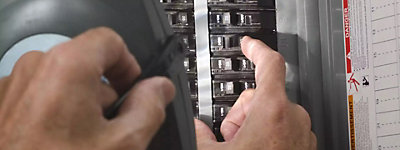
If your AC breaker keeps tripping, it can be a frustrating and confusing problem. If your air conditioner is tripping the breaker, there can be a range of issues behind it, such as a dirty air filter, dirty condenser coils, fan damage in the outdoor unit, a faulty compressor, damaged or loose electrical wiring, or a bad circuit breaker.
You might not know what’s wrong with your AC circuit breaker or how to fix it. Don’t worry – we’re here to help! The Cincinnati air conditioning repair experts at Thomas & Galbraith Heating, Cooling & Plumbing team will explain what an AC circuit breaker is and why the breaker trips. We’ll also share how to troubleshoot certain issues that may be tripping the breaker and when to call an HVAC professional to fix AC units.
What Is the Air Conditioner’s Circuit Breaker?
A circuit breaker is an electrical switch that automatically turns off when the current flowing through it becomes too strong. This prevents damage to the circuit by preventing it from overheating. Circuit breakers can be found in homes, businesses, and industrial facilities.
They are typically located in the main electrical panel, which is typically located in the basement or garage. Circuit breakers come in a variety of sizes and amperages, and they can be either single-pole or double-pole. Single-pole circuit breakers are typically used for small appliances such as toasters and hair dryers, while double-pole circuit breakers are typically used for larger appliances such as ovens and air conditioners .
When choosing a circuit breaker, it is important to select one that is rated for the amperage of the circuit it will be protecting. For example, a 20-amp circuit should be protected by a 20-amp breaker.
Circuit breakers can trip for a variety of reasons, including overloads, shorts, and ground faults. If a circuit breaker trips frequently, it may be an indication that the circuit is overloaded and needs to be replaced with a larger one. Short circuits occur when there is an accidental connection between the hot wire and the neutral wire.
Ground faults occur when there is an accidental connection between the hot wire and the ground wire. Both of these conditions can cause overheating and damage to the circuit breaker, so it is important to have them repaired as soon as possible.
Why Your Air Conditioner Circuit Breaker May Trip
A circuit breaker is designed to trip and cut off the power when it senses an overload on the circuit. This is a safety feature that protects the wiring from overheating and starting a fire.
However, if the circuit breaker is faulty, it may trip even when there is no overload. This can be frustrating, especially if it happens on a hot day when you are trying to use your air conditioner. Here are some of the common reasons your air conditioner may be tripping the circuit breaker.
Dirty Filter in the AC System
A common cause of the air conditioner circuit breaker tripping is dirty air filters. The air filter helps to remove dirt, dust, and other airborne particles from the air as it circulates through the system. Over time, the filter can become clogged with debris, making it harder for air to flow freely. As a result, the air conditioner has to work harder to cool the home, causing a rise in electricity usage. This increase in electricity usage can cause the circuit breaker to trip, disrupting the flow of power to the system.
If your air conditioner’s circuit breaker is tripping, the first thing you should check is the filter and install a new AC filter if needed. To do this, simply locate the filter (it’s usually behind a grate on the front of the unit), remove it, and put in a new one. Once you’ve done this, turn the AC back on and see if the problem has been resolved. If the circuit breaker still trips, you may have a bigger issue that will require a professional to take a look at.
To avoid this problem, it is important to regularly clean or replace the air filter. By doing so, you can help keep your air conditioner running smoothly and prevent unnecessary circuit breakages.
Dirty Condenser Coils Tripping the Circuit Breaker
One of the most common reasons for an air conditioner circuit breaker to trip is dirty condenser coils. As the coils become clogged with dirt and dust, they become less effective at transferring heat. This causes the coils to overheat, which eventually trips the breaker. In addition, dirt and debris can also block airflow through the coils, causing the compressor to overheat.
If you notice that your air conditioner’s circuit breaker is tripping more frequently, it’s a good idea to have the coils cleaned by a professional. The condenser coils are often cleaned as part of a professional maintenance tune-up for your air conditioning unit, so make sure to schedule these each year to prevent circuit breaker problems caused by the condensing coil in the outside AC unit. With regular maintenance, you can help keep your air conditioner running efficiently and avoid costly repairs down the road.
Fan Problems in the Outdoor Unit
A broken coil fan in the outdoor unit can cause the air conditioner circuit breaker to trip for a few reasons. First, the fan is responsible for circulating air over the coils. Without the fan, the coils can’t do their job properly, and the air conditioner will overheat. Second, a broken fan can cause the coils to freeze up, which will also cause the air conditioner to overheat. Finally, a broken fan can cause the compressor to overheat, which is another reason why the air conditioner will trip the circuit breaker.
Sometimes, the fan blades may be causing the issue. Check the blades to make sure they are not damaged or obstructed. If there is debris blocking the condenser fan, turn off the power source to the air conditioner first, then carefully remove the material.
If the fan blades are damaged, or the problem seems to be due to the fan motor or other component, it’s time to call an AC tech for repairs. A broken coil fan in the outdoor unit is a serious problem that can cause the air conditioner to trip the circuit breaker. If you suspect that your fan is broken, it’s important to call a qualified technician for help.
Air Conditioner Tripping Due to Compressor Failure
Another one of the of the most common reasons why an air conditioner trips the circuit is because of a faulty compressor. The compressor is responsible for circulating refrigerant throughout the AC unit, and if it isn’t working properly, it can cause the unit to overheat. In some cases, the compressor may even start to leak refrigerant, which can be dangerous. If you notice that your air conditioner is tripping the circuit more frequently or if it’s starting to make strange noises, it’s important to have a professional take a look at it. Otherwise, you could end up damaging your AC unit beyond repair.
If you have an old AC unit, it may not be able to handle the increased load and will trip the circuit. In older models, the contactor closes with a spring-loaded plunger. The dust and dirt can cause the contact points to become corroded over time, which makes it harder for the contactor to close. This can cause arcing and eventually burning out the contactor. A failed or damaged capacitor will need to be replaced in order to get your air conditioner unit working properly again. Replacing a worn-out or damaged contactor is an inexpensive repair that can prolong the life of your air conditioner unit.
It may be necessary to install a hard start kit for your air conditioning compressor. A hard start kit helps to amperage the low voltage so the compressor can start with less strain. The capacitor provides a boost of energy so that the compressor can overcome any resistance and get started.
Bad Circuit Breaker or Loose Wiring to the Air Conditioning System
One of the most common reasons an air conditioner trips is because of a bad breaker. The breaker is what controls the flow of electricity to the air conditioner, and if it is not working properly, it can cause the air conditioner to trip. A bad breaker can be caused by a variety of things, including a loose wire or a problem with the breaker itself.
If you think your air conditioner has tripped because of a bad breaker, the first thing you should do is check the breaker to see if it is loose or damaged. If the breaker is loose, you will need to tighten it. If the breaker is damaged, you will need to replace it. You can usually find replacement breakers at your local hardware store.
If the wires are not properly connected, they can overheat and cause the circuit to trip. In some cases, the wires may also short-circuit, causing an electrical fire. If you suspect that your air conditioner’s wiring is to blame for its circuit problems, it’s important to have a professional electrician take a look at it as soon as possible. Otherwise, you could be putting your home at risk of serious damage.
Solve AC Circuit Breaker Problems Today
If your air conditioner keeps tripping the circuit breaker and AC system troubleshooting doesn’t keep the AC circuit breaker from continuing to trip, it’s time to call in the professionals. The experts at Thomas & Galbraith Heating, Cooling & Plumbing can help you determine what is causing your AC breaker issue and make the necessary repairs so that your AC unit is running smoothly again. Contact us today to schedule an appointment for AC repair!
Related Reading
Why Does My Air Conditioner Breaker Keep Tripping? Here’s Your Fix!
By Author Michael Joseph
Posted on Last updated: July 24, 2022
Your AC breaker is a safety feature that automatically turns off the system whenever a power overload is detected. If your air conditioner breaker keeps tripping, it’s because the system is taking in more amps than it’s rated for, which could happen for several reasons.
This happens to prevent damage to your equipment from overloaded circuits. So make sure that you don’t ignore the issue if it’s one that you’re having.
Most importantly, don’t continue to reset your AC breaker . Your main goal should be figuring out what the problem is so that you can solve it or hire a technician. We put together this article to help you do that, so keep reading to learn more.
Start with these steps
It bears repeating: You don’t want to just continue flipping back the breaker switch if it keeps tripping. Instead, follow these steps to start isolating the issue so that you can solve it safely:
- Turn off your air conditioner at the thermostat.
- Flip the AC circuit breaker switch into the “ON” position.
- Wait for about 15 minutes with the air conditioner off.
- Turn the air conditioner to the “COOL” setting.
Here’s what might happen next
After you complete the four steps shown above, there are three different things that might happen. We’ll cover each of those below.
1. It operates normally without tripping the breaker
If this happens, great! It’s a sign that your air conditioner is back to working normally. It means that your issue was likely tied to a momentary power surge or some other chance occurrence that won’t happen again.
These types of issues are generally not something you need to look further into unless they happen consistently. It’s often caused by a problem that’s external to your household.
2. It works for a while and then trips the breaker again
This could also happen, which can be frustrating. But the good news is that you may be able to solve the problem yourself. You can try replacing your AC air filter to see if that works.
Your air conditioner relies on a clean air filter to get the airflow that it needs to function properly. When the filter is dirty, the system has to work harder, and that can lead to overheating that trips the breaker.
Replacing your filter is super straightforward. You can refer to your owner’s manual to get step-by-step instructions that are specific to your system.
3. The breaker trips immediately
It’s also possible that the breaker will trip right away after you turn your AC back on. Unfortunately, this isn’t something that you’re likely going to be able to fix on your own. Instead, it’s time to call out an AC repair company to come and take a look at your unit.
You can also keep reading to learn more about the mechanical reasons why this keeps happening.
Here’s why your air conditioner breaker keeps tripping (from best-case to worst-case scenario)
The circuit breaker is faulty.
This is the best-case scenario because it means that you need to fix the breaker, not your AC unit. It means that your issue will probably be less expensive to solve.
There are a few reasons why this could happen. One is that you may have a circuit breaker box that doesn’t give your home enough power. For example, a 4.5-ton air conditioner typically needs a 35A breaker to work correctly.
It may also be as simple as a loose wire. These can happen due to natural contractions and expansions that occur when the temperature changes over time.
Here are some of the top signs that you’ve got a bad breaker:
- There’s a burning smell near the breaker box. This can happen when wires and their insulation get overheated.
- Your breakers are hot to the touch. This is self-explanatory. The same heat that leads to your wires burning can also cause the breakers themselves to get warm.
- You can see visible damage on the circuit breaker.
The solution to a bad breaker is to replace it with a new one . You can confirm that this is necessary by seeing if a breaker is loose when you manipulate it.
The good news is that these are pretty inexpensive and not the most challenging thing to replace. But if you’re not comfortable with electrical work, then an electrician should be able to handle it for you at a reasonable price.
You have dirty condenser coils
It’s also possible that your air conditioner circuit breaker keeps tripping because you’ve got dirty condenser coils. This part’s job is to release heat from the inside of your home outside. It’s typically on your outer unit, which means it’s constantly exposed to the outside elements (wind, snow, etc.).
Condenser coils may get covered with various types of grime and debris periodically. When this happens, they aren’t able to release the heat that they need to. This causes your AC to work harder and can lead to overheating that trips the safety breaker.
You should be able to see this visibly, as most modern units discharge warm air out of the top.
Fixing this problem may be as simple as cleaning the condenser coils . You can open up your outdoor system and look for any dirt. When you see some, spray it with a cleaner and wipe it with a rag.
Luckily, you don’t need a complicated cleaning solution for this task. You can just mix together some warm water with your favorite cleaning product, and that should be enough.
Your fan motor is malfunctioning
The overheating problem that you’re experiencing may also be tied to your air conditioner’s fan motor.
This problem is similar to what can happen with your condenser coils. The same outside elements could reduce the efficiency of your fan, which causes the AC unit to have to work harder.
That creates a situation in which your air conditioner is drawing more electricity than it would normally need to compensate for the lack of efficiency. If this happens consistently, the capacitor can overload. And your air conditioner will trip your breaker as a result.
You can check for this issue by looking to see if your outdoor fan is spinning . If it is, then your problem may lie elsewhere. But if it’s not, you might have a broken fan motor that needs to be replaced. It will cost about $250 to $700 to replace on average.
That being said, make sure to look into the various reasons why a fan may not be spinning . Because it can be indicative of several different problems.
Your evaporator coils have frozen
It’s also possible that your evaporator coils have frozen, and that’s causing your AC circuit breaker to trip continuously. This can happen when too many debris accumulates in your system and airflow is reduced.
This is a pretty straightforward issue to spot. Simply take a look at your evaporator coils and see if there’s any ice on them. You may also want to check for puddles of water nearby in case they’ve recently thawed.
The solution is to give your evaporator coils 24 hours to thaw out . While that’s going on, you can clean the coils to make sure this doesn’t happen again.
You may also want to give your entire air conditioner a thorough cleaning and swap out the air filter. The cleaner your system is, the more airflow that it gets. And that will decrease your chances of experiencing frozen coils again the next time you use your air conditioner.
You’ve got low refrigerant levels
Air conditioners use refrigerant to cool down the air that they process. This liquid is designed to be a closed loop that doesn’t need topping up under normal circumstances.
However, sometimes you can get punctures in your refrigerant lines, which lead to lower refrigerant levels over time. This will cause your system to pull in too much power and may lead to tripped breakers.
The only solution to this problem is to call an HVAC professional . Refrigerant is a toxic liquid that isn’t safe to deal with unless you know the proper way to do so. To avoid putting yourself or your family at risk, it’s best to let a professional take over from here.
The compressor isn’t starting
Finally, the problems you’ve been experiencing could also stem from the compressor itself. It may have trouble starting, which could cause it to draw in too much power and trip the breaker immediately.
Normal AC units should turn on within about a second of the time that you flip the switch. If your air conditioner takes longer than that to get going, it’s a big sign that you’ve got a compressor issue.
The unfortunate news is that compressor repairs and replacement cost about $1,250 on average . That means it may make more sense to just replace your system with a new one at this point—especially if you’ve had the current AC for a long time already.
Either way, your next step is to call an HVAC professional so they can diagnose the problem and advise you on your options.
- Recent Posts
- What to Do if Your House Smells Like Gas but There’s No Leak - February 6, 2023
- Why Is There a Burning Smell Coming From My Vents? - August 16, 2022
- How to Remove the Musty Smell From Your Air Conditioner - August 16, 2022
- Referral Club
- Service Area
No Results found
Please try again.

6 REASONS YOUR AIR CONDITIONER KEEPS TRIPPING THE CIRCUIT BREAKER
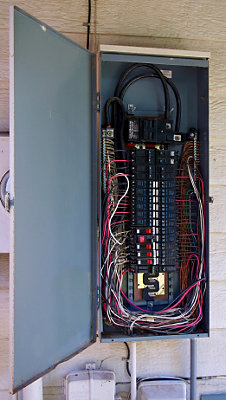
So, you've determined that your AC is tripping the breaker, but you're clueless as to why.
Well, an air conditioner usually trips the breaker because it's pulling in more amps than the breaker is rated for. That is, if you have a 20-amp breaker and the AC pulls 30 amps, the breaker trips.
That's why breakers trip: to protect you from over currents that can damage equipment and cause fires (yikes).
So DON'T keep resetting the breaker and letting it trip. Constant tripping can harm equipment and cause a fire. Find the cause of the problem first.
Common causes of an air conditioner tripping the breaker include:
- Dirty air filter
- Dirty outside unit
- Issue with the circuit breaker
- Motor has shorted
- Compressor has trouble starting
- Compressor is grounded
You can fix the first problem yourself, but everything else requires an AC repair technician.
Read on to learn why these problems cause an AC to trip the breaker.
Or you can schedule an AC repair with us right away if you live in the metro Atlanta, GA area .
Now, on to the reasons your AC keeps tripping the circuit breaker
- Dirty air filter Imagine forcing a pillow over your face. Hard to breathe right? That's what a dirty filter does to your AC blower; the blower has to work longer and harder to circulate air through the filter. This causes the blower to draw more electricity and trip the breaker. Solution : Change the air filter.
- Dirty outside unit Your AC system has an inside unit and an outside unit. The inside unit absorbs heat from your air using refrigerant. That refrigerant flows to the outside unit to disperse the heat. However, the outside unit can't disperse heat well if it's super dirty because dirt is an insulator. So the AC runs and runs trying to disperse that heat outside until-click-the breaker trips due to drawing too much current. Solution: Get an AC tech to properly clean the outside unit. You may be thinking, "Why can't I clean it myself?" Well, you lack the cleaning equipment and cleaning chemicals to clean the condenser coil professionally (and buying the wrong type of equipment can do more harm than good to the condenser). Plus, cleaning it improperly could damage/flatten the fins wrapped around the coil. This blocks airflow over the coil and is just as bad as having the coil matted with dirt.
- Issues with the circuit breaker The issue may not be with the AC itself but rather with the breaker. Wires connected to the breaker may be loose or the breaker itself may be bad and needs replacing. This is a relatively inexpensive fix. Solution: Have a tech tighten connections to the AC's breaker or replace the breaker.
- Motor has shorted Electric motors in your AC can run for hours and hours and can take quite a bit of abuse. But if a motor runs hot for too long, the wire insulation can break down, leading to an electrical "short." A "short" is where electricity bypasses its normal path, (so it's taking a "shortcut"). This shortcut allows more electricity to flow than the wires can handle, causing the wires to overheat, melt and cause a fire. Of course, before the fire happens, the circuit breaker trips. Solution: Call an AC repair technician to find the source of the short.
- Compressor has trouble starting The heart of your AC system is the compressor. It pulls tons of electricity when it starts up. Unfortunately, as the compressor ages, it has trouble starting (called hard starting) and pulls even more electricity, causing the breaker to trip as a result. Solution: Have an AC technician install a "hard start kit" which is a capacitor that gives the compressor motor an extra electrical "jolt" to get it moving. However, the compressor may be old or damaged and need to be replaced instead.
- Compressor is grounded A "grounded compressor" or "compressor short to ground" means that an electrical winding inside the compressor has broken and hit the side of the compressor. This causes a direct short to ground, igniting the oil and causing a burnout. And, of course, the circuit breaker trips due to the sudden current surge. Solution: This is the worst-case scenario. An AC tech will have to replace the compressor and clean the refrigerant lines. If your compressor is out of warranty (or your warranty never covered it), you might as well replace the entire outside unit. Cheaper that way. (Compressors are pricy.)
Need an AC repair in metro Atlanta? Call Ragsdale Heating and Air
If you've changed the filter and that didn't help, call Ragsdale to schedule local expert AC repair . If you live in the metro Atlanta, GA area, schedule an AC repair with Ragsdale. We serve cities all over the Atlanta metro area and beyond including Dallas , Alpharetta , Marietta , Roswell , Woodstock , Rockmart , Rome , Kennesaw , Loganville , Snellville , Lawrenceville , and more.
Related Reading
Join our email newsletter.
Receive updates, current news, promotions, and industry tips.

AC Breaker Keeps Tripping? Here’s What You Need to Know for a Quick Fix
We know this can be a bothersome problem, but we’re here to help you get it sorted out quickly and easily. An AC breaker that trips often is usually caused by an issue with your circuit wiring or by a malfunctioning appliance.
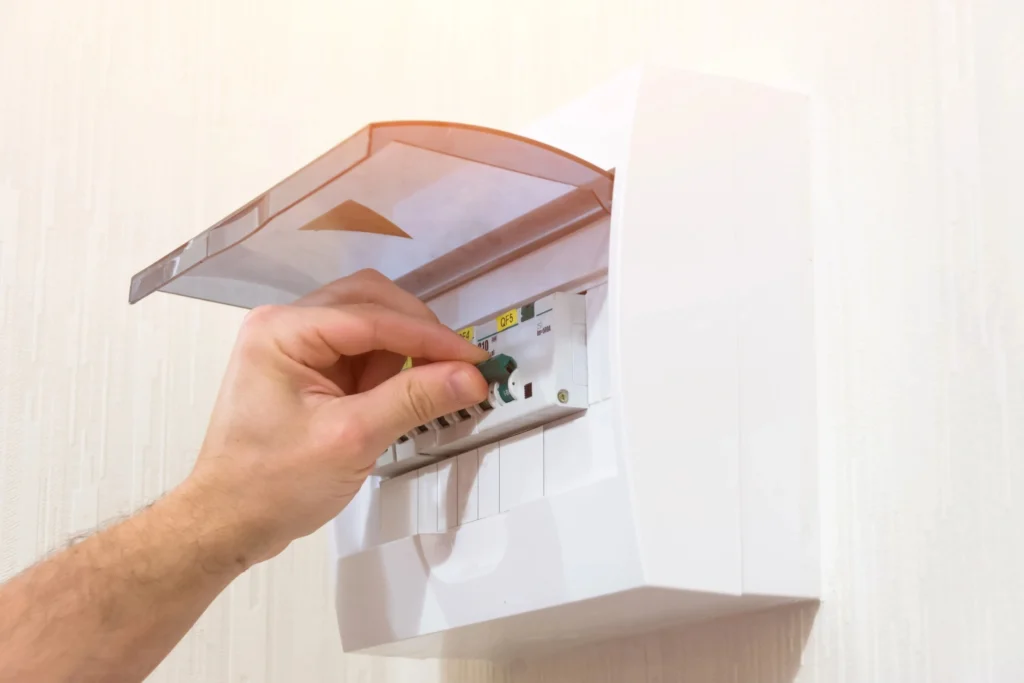
Identifying the source of the issue before attempting any repairs is essential. Once you’ve identified the source of the problem, we’ll explain how to take care of it in just a few simple steps. If your AC breaker keeps tripping and you’re looking for a quick and easy fix, this article is for you!
What Is an AC Breaker?
An AC Breaker is a crucial safety feature in your home’s electrical systems that helps protect against overloads and short circuits. It works by breaking the circuit and cutting off electricity when it senses an overloaded or short-circuited wire.
You can find these devices in your main electrical panel, as well as individual outlets and switch boxes throughout your home – making sure that you and your family are always safe from harm.
The AC breaker consists of two parts: a circuit breaker switch and a trip indicator. The circuit breaker switch is responsible for cutting off power when it detects an overload or short circuit – this prevents further damage to your wiring and appliances.
The trip indicator shows whether the breaker has been tripped, allowing you to reset it if necessary.
Why Do AC Breakers Trip?
If your AC keeps tripping the breaker, the most common causes are either too much current being drawn from one circuit or a short circuit caused by faulty wiring or a damaged appliance.
If any of these conditions are present, it can cause the breaker to trip and shut off the power to that area of your home.
Other potential causes include a failed motor or compressor in your air conditioner or even dust accumulation on the breakers themselves.
What To Do When Your AC Breaker Trips
Is your AC tripping the breaker? It can be an annoying and inconvenient issue to deal with. But don’t panic – there are a few simple steps you can take to try and fix the problem.
Check your air conditioner’s filter. A clogged filter can cause the breaker to trip by overloading the circuit. Replace or clean it if needed.
Look for any signs of damage on the wiring leading up to the AC unit. If the wiring looks frayed or damaged in any way, call a licensed electrician for help as soon as possible.
If none of these solutions work, it might be time to upgrade your electrical panel or have an electrician install a higher-capacity breaker specifically designed for your air conditioning system. By taking these steps now, you can avoid costly repair bills down the road and get back to feeling comfortable in no time!
Common Causes of AC Breakers Tripping
There are many possible reasons why your AC unit keeps tripping the breaker. Below, we’ll take a look at some of the most common.
A Dirty Air Filter
One of the most common causes of an AC breaker tripping is a dirty air filter. When an air filter becomes clogged with debris, it can cause your system to work harder than it needs to and eventually trip the breaker.
You’ll want to ensure you regularly check and replace your air filters to keep them clean and functioning properly.
Dirty Condenser Coils
Another potential culprit for a tripped AC breaker is dirty condenser coils. These coils are responsible for releasing heat from the system, so if they become covered in dirt or other debris, they won’t function as efficiently and could potentially cause your breaker to trip.
Make sure you routinely inspect and clean your condenser coils for optimal performance. If your AC trips the breaker after 5 minutes of working, this is a possible cause.
Broken Coil Fan
A broken coil fan could also be causing your AC’s breaker to trip. The fan helps circulate cool air throughout the room, but when it stops working properly, this disruption can put a strain on the system and cause it to trip the breaker as a safety measure.
If you suspect that your coil fan may be malfunctioning, contact an HVAC technician right away so they can diagnose the issue and repair any damages quickly.
Problematic Compressor Start-up
One of the more common causes of an AC breaker tripping is a problematic compressor start-up. If your compressor is having trouble starting up, it can draw too much current and cause the breaker to trip. This problem is usually caused by faulty wiring or parts, such as a capacitor or motor winding.
Loose Wiring or Faulty Parts
Loose wiring or faulty parts are also frequent culprits behind AC breakers tripping. Loose connections can create dangerous arcs that will cause the breaker to trip.
Additionally, if some internal part in your AC unit has become damaged and isn’t working properly, it could also lead to an overload that trips the breaker.
Too Little Refrigerant
Another common reason for AC breakers tripping is too little refrigerant in the system. This can happen when there’s a leak in the system somewhere, which causes the refrigerant levels to drop below the required amount for your AC unit to work properly.
When this happens, your unit will have difficulty cooling down and not be able to handle large loads efficiently—causing it to trip its own breaker as a safety measure.
The Compressor Is Grounded
If your AC’s compressor is grounded, then it could be the cause of your breaker tripping. This can happen if a wire becomes loose or disconnected or if the wiring around the compressor has been damaged due to corrosion or wear and tear.
To check for this issue, you should inspect the wiring and connections around the compressor. If all looks okay, you’ll need to call in a professional to take a closer look.
The Evaporator Coil Is Frozen
Another common cause of an AC breaker tripping is a frozen evaporator coil . This occurs when air isn’t flowing properly through the unit, and as such, causes an overload on the system, which trips the breaker switch.
To fix this issue, you’ll need to clear any blockages from your AC vents so that airflow can be restored. You may also need to replace any broken parts inside your unit for optimal performance and safety.
The Circuit Breaker Is Faulty
If your AC circuit breaker keeps tripping, it’s possible that your circuit breaker itself is faulty and needs replacing in order for it to operate correctly again. A qualified electrician will be able to diagnose whether this is an issue by testing the circuit breaker for any signs of wear or damage.
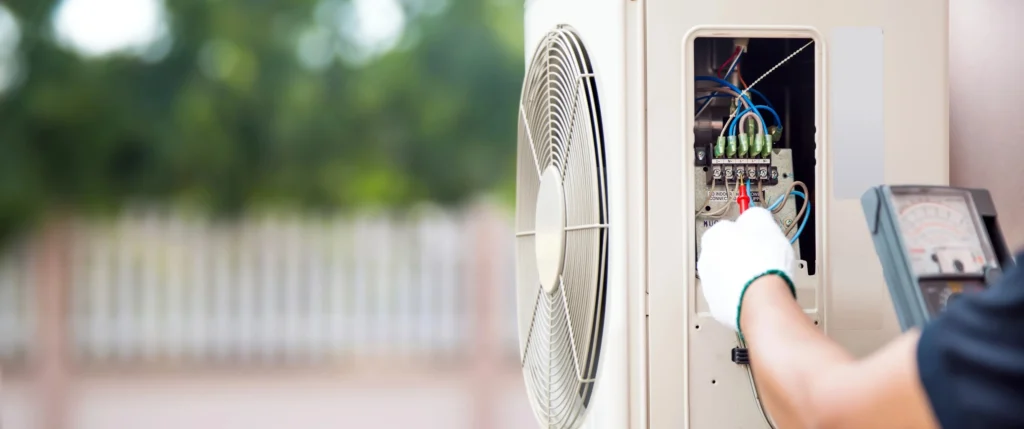
If you do find yourself needing a new one, ensure to get one with an appropriate amperage rating that matches up with your home’s electrical system requirements!
While the steps listed above are excellent ways to identify why your AC breaker keeps tripping, we wouldn’t recommend working with electricity without some form of training. The problems are often relatively minor, but the risks involved when working with electricity simply aren’t worth it to save a few bucks.
The bottom line is that if your AC breaker keeps tripping, the best thing to do is to call a qualified AC technician for help. An experienced technician can diagnose why your AC breaker keeps tripping and then take steps to ensure it doesn’t happen again.
While it may seem like a hassle, having your AC breaker checked out by an expert can help you avoid costly repairs down the road. Safety should always come first when dealing with electricity – so don’t take any chances!
If you have an AC unit, you’ve probably wondered how long it will last. And why wouldn’t you? You’ve spent a lot of money on your unit.
When it comes to keeping your home comfortable, the choice between a heat pump and central air conditioning can feel like a crossroads. Each…

Why Is My Air Conditioner Tripping the Circuit Breaker?

Reasons for the AC to trip the circuit breaker range from the obvious “human error” issues with easy fixes to more complex matters for handy homeowners or licensed technicians to repair.
It’s a hot day and your house is uncomfortably warm. The thermostat is set to “cool” and the selected temperature is much lower than the displayed room temperature, but your AC unit is not working. A check of the circuit panel reveals that the breaker marked, “A/C” is tripped; it’s in the “off” position. Flipping it back to the “on” position has not solved the problem. Maybe the AC ran for a while and stopped again, or maybe the breaker tripped again immediately and won’t reset.
You might call a competent repair service and leave it to them to diagnose and fix the problem, but if you are a little bit handy – or even very handy – you might want to see if you can take care of it yourself before calling in the pros. Here are some things that can cause your AC circuit breaker to trip, and some things you might be able to do about it.
Content Navigation
Non-Electrical Causes of the AC Tripping Circuit Breaker
Check these before calling for service.
1. Your Outside AC Unit Has a Cover On It
At any big box store, your local hardware, or online, covers for the outside component of your AC system – the condenser – are available from as little as $10 to over $100 , depending on the materials used to make them. Some people like to put a cover on their condenser even though they usually don’t really need it. But what happens if you forget to remove it before starting up your AC in the Spring? The unit will quickly overheat and the circuit breaker will trip. Simply remove the cover and allow the unit to cool down before trying it again.
2. A Very Dirty Furnace Filter
Here’s another one that just requires a gentle reminder.

Your central air conditioning system is part of the complete heating and cooling (HVAC) system in your home. It uses the same air ducts to circulate air throughout your house, and the same air filter through which all this cool (or warm) air flows. That means it is used much of the time, has a lot of air pass through it, and collects a lot of dust, dirt and pet hair (human hair, too).

If the filter is very dirty, it can cause the AC system to work so hard that it will trip the circuit breaker. Change your air filter at least every 3 months, and if you find it to be quite dirty at that time, you might want to check it monthly just to make sure it’s not too dirty.
3. A Dirty Condenser Coil
This is located in the outside AC unit, the cabinet that is usually in the back of your home or on a side where it is not easily seen. Inside this cabinet – around the sides – is the condenser coil. It looks something like a vehicle radiator, with many shiny aluminum “fins” and tiny openings for air to travel through. When the AC is running, air is drawn in through the sides of the cabinet, through the condenser, then out through the top by a fan. Dust, dirt, leaves, seeds and other outdoor debris can get trapped in the condenser coil and cause an “overload” when the system tries to start, tripping the circuit breaker.

To solve this problem, first make sure to disconnect the power to the outside AC unit. There is usually a disconnect plug very close to this unit which should be pulled out. It is also a good idea to turn the AC off inside the house. Remove the fan and grill from the top of the cabinet with the screws holding it in place and set the fan off to the side, being careful to not damage its connecting wires.
Rinse the condenser coil thoroughly with water, either with a nozzle on a spray setting, or just by squirting it from the hose with your finger. Do not use a pressure washer. Too much pressure can damage the delicate fins and keep the unit from circulating air efficiently. It is best to rinse from the inside out, so as to not push the offending debris deeper into the coil.
We’ve recommended the top tips and the Best Coil Cleaners in this Guide .
4. Too Little or Too Much Refrigerant
This isn’t one you can check, but it’s a possibility to discuss with an HVAC pro.
Every AC system uses a special liquid refrigerant which circulates through its components to make it work efficiently. The system is sealed, so it usually doesn’t require any additional refrigerant for life. If your AC has developed a leak, it will lose refrigerant, cause it to malfunction, and possibly trip the circuit breaker.
Normally, when a competent technician has fixed a leaking problem, everything should work as it is intended to.
However, if the technician somehow “overcharged” your system by putting too much refrigerant in, that can also result in a tripped AC circuit breaker. Always be sure to hire a well-respected and competent service technician if you need professional help with your AC.
Electrical Problems
Some of these are DIY opportunities if you are familiar with electrical systems and testing them.
1. Burned Out Condenser Fan Motor
This is the fan motor located at the top of the outside cabinet. If this motor burns out, it can definitely cause the AC circuit breaker to trip. One simple test that you might try to confirm that this is the problem is to gently spin the fan blade with a stick or long screwdriver. The fan blades are easily seen through the grill on top of the cabinet. If the fan turns very sluggishly or barely turns at all, the motor is most likely burned out.
Another, but more involved way to test the fan motor is to trace the wires from the fan motor to the electrical component panel. This panel will be located on the same side of the cabinet that the wires come in from your house. First, make sure to pull the disconnect plug near the outside unit. Remove the side panel and find the wires from the fan motor. Identify them by their colors. Remove them from the terminals and make sure they are not touching any metal or each other.
Now turn on the AC. If it doesn’t trip the breaker with the wires removed, the problem is with the fan motor. To confirm this, turn off the breaker again, replace the fan motor wires in the panel and turn the breaker back on. A burned out fan motor will cause the circuit breaker to trip again and it won’t reset. Contact a competent technician to replace it if you do not feel that you can do the job yourself.
2. Bad Wiring/Wire Shorted to Ground
This problem would most likely be in the outside cabinet. After first pulling the disconnect plug, a careful inspection of all wiring is what is needed to find the trouble. Check all wiring between the disconnect and the cabinet. Look for damaged areas – perhaps where wires run into the cabinet, though they are often in a conduit.
Remove the side panel where the wiring enters the cabinet; all the electrical stuff is there. Look for mouse nests, chewed or broken wires, especially those that lie against the metal cabinet. If a bad wire is found, cut and reconnect it with a butt connector and crimp pliers.
Another place to check is inside the box on the side of the compressor. The compressor is the “can-looking” part that is located on the bottom of the cabinet, and must be accessed by removing the fan and top grill. There are 3 wires inside the box on the side of the compressor. Check these wires for frayed areas, especially if they are lying against the side of the box.
A problem with one or more of these 3 wires can be fixed with a QwikLug™ repair kit that can be purchased at most big box stores or anywhere that sells AC supplies.
3. The Compressor Is Drawing Too Much Power On Start Up
Do the lights in your house dim whenever the AC starts. This could be the reason.
The compressor does a lot of work, and especially after several years, can begin to draw more electrical power due to wear. This is not too unusual and can often be at least temporarily fixed by installing a “hard start” kit . This can reduce the amperage draw on start up by up to 50%. If you’re handy with electrical components, you may be able to do this yourself. If not, be sure to hire a competent service technician.
4. The Compressor Is Shorted Out/Shorted to Ground
If your AC breaker keeps tripping, a shorted out compressor is another likely cause. If it is, installing a new compressor is the solution, but it is usually best to replace the entire condenser, the whole outside component of your central air system. Bad compressors usually only happen in older air conditioners, and it’s more cost effective to start with a completely new condenser unit than to try to put an expensive new compressor in an old system. According to our AC Repair Guide , compressor replacement cost is $1,250 to $2,500 based on the size and model of the condenser unit. That money is probably best spent on a new system if your current unit is no longer under warranty.
Pro Tip: Make sure your warranty stays in effect by having your AC serviced every year – and keeping the records!
Like roofing companies, car manufacturers and others, HVAC equipment companies are notorious for denying warranty claims. Most warranties state that the homeowner must have the system serviced by a pro every year or the warranty will be voided. So, look for an HVAC company with a good reputation and affordable service plans, and sign up for one. With a service plan, you’ll get discounts on the maintenance and possibly on repairs too. There’s more information in our HVAC Warranty Guid e, the most comprehensive of its type.
To test to see if your compressor is bad, first pull the power disconnect near the outside cabinet. Remove the grill and fan from the top by taking out the screws that hold it in place and carefully set it to one side. On the bottom of the cabinet, you will see the compressor, while the aluminum condenser coils will be on the sides.
Near the bottom of the compressor will be a box where the wires come in. Remove the cover to this box, and you will find 3 wires. There are two ways to test for a bad compressor; with or without a multi-meter.
With a meter: Set the meter to “continuity” or ohms (Ω). Pull one wire off at a time and check the pin (not the wire) for continuity to the compressor case. They should all test “open” or OL. If any of the wires test otherwise, that pin is shorted to the casing, which is ground. This means the compressor is bad.
Without a meter: With all 3 wires removed and not touching each other or the case, turn on the circuit breaker in the house and reconnect the disconnect plug by the outside unit. At the thermostat, make sure that the AC is on and at a temperature low enough to call for cooling. If the circuit breaker does not trip, the problem is probably a grounded compressor.
To confirm this, turn off the AC again, pull the power disconnect plug and replace the 3 wires on the compressor. Replace the power disconnect plug and turn on the AC again. If it immediately trips the circuit breaker and it won’t reset, it is definitely a grounded compressor.
5. A Defective Contactor
The contactor is another electrical part in the outside AC unit. This can go bad, but it is quite unusual for it to happen. It must be tested with the power on, and is best done by a competent service technician. Does the unit sometimes buzz too? This is a clue that it is the contactor!
6. A Weak Circuit Breaker
If your AC breaker keeps tripping, it could be worn out. Sometimes – over time – circuit breakers can become “weak” and will trip, especially when a load is first placed on them. In one sense, this is a simple problem because it only requires replacing the breaker. However, it should not be considered lightly, because it requires the opening of the main power panel in the house and working with “live” power inside the panel.
If you have checked everything else and are still having trouble with the AC circuit breaker tripping, it’s best to contact a service technician to replace the breaker unless you are fully acquainted with working inside power panels.
When it comes to an AC circuit breaker tripping, one thing is sure: there is a definite reason for it to be happening. Just remember, central AC systems operate on 240 volts of electricity, so if you suspect any of the problems that appear to be electrical, be very careful unless you know what precautions to take. If not, be sure to contact a professional in your area who will be able to help you.
Written by Rene Langer
Share Your HVAC Quote/Cost
We rely on readers like you to share your HVAC system cost or quote. It really helps other visitors to estimate the cost of a new HVAC unit.
Leave a Comment Cancel reply

Why Is My Ac Breaker Tripping?
Your AC breaker may be tripping due to a variety of reasons, including a dirty air filter, a refrigerant leak, an electrical issue, a malfunctioning thermostat, or a problem with the compressor.
However, the most common reason for an air conditioner circuit breaker to trip is because the air conditioner is overloaded. This can happen if the air conditioner is too big for the space it’s cooling, or if there’s something blocking the airflow.
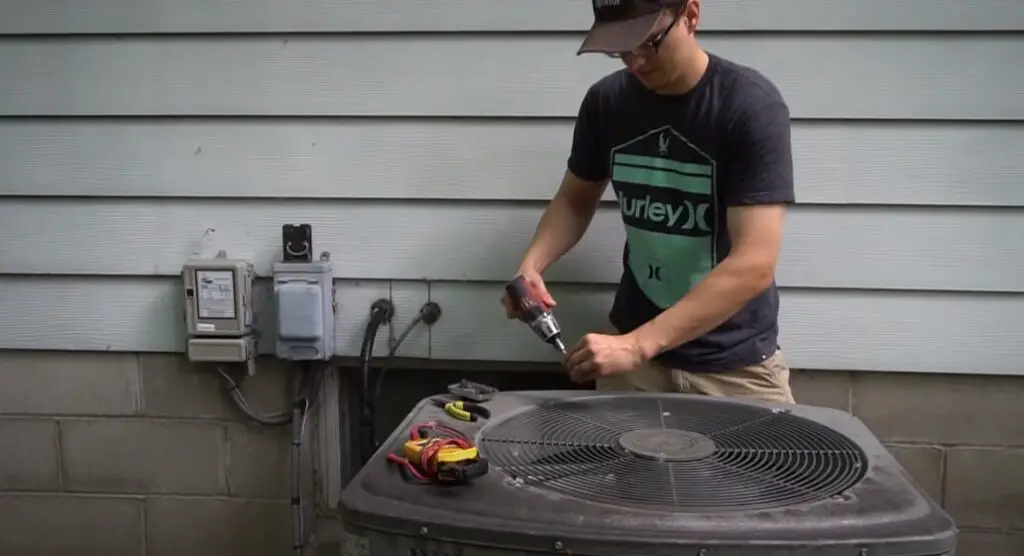
Page Contents
Why Does Air Conditioner Breaker Keep Tripping?
One of the most common reasons for an air conditioner breaker to trip is a dirty filter. When the filter gets clogged with dust and dirt, it puts strain on the motor which can cause it to overheat and trip the breaker. If this is the case, simply replacing the filter should fix the problem.
Another possibility is that there’s an issue with one of the electrical components in your AC unit. This could include a faulty capacitor or contactor. If you suspect there may be an electrical issue, it’s best to call in a professional for help.
Trying to fix it yourself could be dangerous if you’re not experienced in dealing with electrical issues.

How do I stop my AC from tripping the breaker?
If your air conditioner keeps tripping the breaker, there are a few things you can check yourself before calling a professional.
First, check to see if the breaker is properly sized for your AC unit. If it is too small, it will trip more easily. Second, check for any loose wires or other electrical problems that could be causing the breaker to trip.
Finally, make sure the AC unit is properly ventilated. If it is not, it can overheat and trip the breaker.
Why is my AC breaker popping?
Assuming you have a central air conditioning unit, there are several reasons why your AC breaker might be popping.
One reason might be that your AC unit is overloaded. This can happen if you have too many appliances plugged into the same circuit as your AC unit. To fix this, you can either unplug some of the appliances, or plug your AC unit into a different circuit.
Another reason might be that your AC unit is faulty. This could be due to a number of different issues, including a short circuit, a loose wire, or a problem with the compressor. If you think your AC unit is faulty, you should call a qualified technician to come and take a look.
Finally, if your AC unit is old, it may simply be that the breaker is worn out and needs to be replaced. This is a relatively easy fix – just replace the breaker with a new one. If your AC breaker keeps popping, it’s important to figure out the cause so that you can fix it. Otherwise, you run the risk of damaging your AC unit or causing a fire.
How do you know if your AC breaker is bad?
If your AC unit isn’t working, one possible reason is that the breaker is tripped. To reset the breaker, simply flip it to the “off” position and then back to “on.” If the breaker trips again, this is an indication that there is a problem with your AC unit and you should call a technician for further diagnosis.
Ac Trips Breaker Immediately
If your air conditioner trips your breaker immediately, there are a few things that could be causing the problem. The most likely culprit is a short circuit in the AC unit itself. This can be caused by a number of things, including a loose wire or a faulty component. If you suspect a short circuit, you should call an AC repair technician to come take a look. Another possibility is that your AC is simply overloaded. This can happen if it’s working harder than usual to cool your home, or if it’s been turned on after being off for a while. In this case, you’ll just need to give the unit some time to rest before turning it back on. If the problem persists, though, it’s worth calling an AC repair technician to take a look and see if there’s anything else going on.
Ac trips breaker after 5 minutes
If your air conditioner trips your breaker after just five minutes, there could be a few different issues at play. First, check to see if your unit is overloading the circuit. If your AC is the only thing on the circuit, and it’s tripping the breaker, then it’s likely that your unit is too powerful for the circuit it’s on. You’ll need to have an electrician rewire the circuit to a higher capacity, or move the AC to a different circuit. Another possibility is that there is a short circuit somewhere in the AC unit. This could be caused by a faulty wire or component. You’ll need to have an AC technician take a look at your unit to diagnose and repair the problem. Finally, it’s possible that the breaker itself is faulty. This is most likely if the breaker trips as soon as the AC is turned on, or if it trips regardless of what else is on the circuit. If you suspect the breaker is the problem, you’ll need to have an electrician replace it.
Ac breaker tripped and won’t reset
If your air conditioner’s circuit breaker has tripped and won’t reset, there are a few possible causes. The most common cause is a power surge or spike, which can overload the circuit and cause the breaker to trip. Other causes can include a short circuit, or a problem with the air conditioner itself. If you suspect a power surge or spike is the cause, unplug the air conditioner and check the circuit breaker. If it is still tripped, you may need to reset the breaker or have an electrician look at the system. When the breaker trips again, there may be a problem with the air conditioner itself and you should call a repair technician.
How to reset ac circuit breaker?
If your air conditioner keeps shutting off, it may be time to reset the circuit breaker. Circuit breakers are designed to trip when they sense an overload of electricity. This protects your air conditioner from damaging itself with too much power. To reset the circuit breaker, find the breaker box and flip the switch to the “off” position. Wait a few minutes, then flip it back to the “on” position. If the breaker trips again, it’s time to call a professional to help you troubleshoot the problem.
Ac compressor tripping after few seconds
If your AC compressor is tripping after just a few seconds of operation, there could be several reasons behind it. One possible cause is an electrical issue, such as an overloaded circuit breaker or a short circuit. To address this, it is recommended to contact a qualified electrician who can inspect and resolve the problem.
Another potential cause could be dirty condenser coils, which can impede airflow and cause the compressor to overheat. To rectify this, ensure that the coils are clean and free from debris. You can either use a coil cleaner or seek assistance from a professional HVAC technician to spotless them.
Low refrigerant levels can also lead to the compressor tripping. If the refrigerant levels are too low, it may indicate a leak in the system. To address this issue, it is best to contact a professional HVAC technician who can locate and repair the leak and then recharge the refrigerant to the appropriate levels.
A faulty capacitor is another possible culprit. The capacitor provides the initial power boost required to start the compressor. If it is defective or failing, it can cause the compressor to trip. A qualified technician can test the capacitor and replace it if necessary.
Finally, the compressor motor may be experiencing excessive load or mechanical issues, resulting in frequent tripping. This could be due to a faulty motor or compressor itself.
To diagnose and repair this problem, it is advisable to consult a professional HVAC technician who has the expertise and equipment to handle such issues safely.
Ac compressor tripping after few minutes
If your air conditioner’s compressor is tripping after only a few minutes, there are a few possible causes. The most likely culprit is a problem with the compressor itself. It could be overloading, or it could be faulty. If the compressor is the problem, you’ll need to have it repaired or replaced. Another possibility is that the problem is with the air conditioner’s electrical system. If the compressor is tripping the circuit breaker, there may be a problem with the wiring. It’s also possible that the air conditioner is drawing too much power, and the circuit breaker is tripping to prevent a fire. If you suspect that the electrical system is the problem, you should have it inspected by a qualified technician. Finally, it’s possible that the problem is with the air conditioner’s refrigerant levels.
If the compressor is tripping because the refrigerant levels are too low, you’ll need to have the air conditioner serviced to add more refrigerant. If your air conditioner’s compressor is tripping after only a few minutes, there are a few possible causes. The most likely culprit is a problem with the compressor itself. It could be overloading, or it could be faulty. If the compressor is the problem, you’ll need to have it repaired or replaced. Another possibility is that the problem is with the air conditioner’s electrical system.
Circuit breaker for air conditioner
If your air conditioner keeps tripping your circuit breaker, there are a few possible explanations. The most common cause is a problem with the air conditioner itself. If your air conditioner is old, it may be time for a replacement. Another possibility is that the air conditioner is overloaded and needs a bigger circuit breaker. If you have a newer air conditioner, the problem may be with your electrical wiring. If your circuit breaker is constantly tripping, you should have an electrician check your wiring to see if it is up to code. When your air conditioner is tripping your circuit breaker, don’t ignore the problem. It could be a simple fix, or it could be a sign of a more serious problem. Either way, it’s best to have a professional take a look to be safe.
Can a bad ac capacitor cause the breaker to trip?
If your air conditioner’s capacitor is bad, it can cause the breaker to trip. The capacitor is responsible for providing the electrical current that helps start up the compressor. If the capacitor is damaged, it can’t provide the necessary current, which can cause the breaker to trip.
Refrigeration compressor tripping breaker
If your refrigerator’s compressor is tripping your breaker, there are a few possible causes. The most common cause is a faulty compressor start capacitor. A start capacitor gives the compressor a boost of energy to start, and if it’s failing, the compressor can’t start properly. Another possibility is that the compressor itself is faulty. If the compressor is drawing too much power, it can trip the breaker. This is usually caused by a problem with the compressor’s internals, and will require a replacement. Finally, it’s possible that the breaker is simply too small for the refrigerator. If the fridge is new or has recently been upgraded, the breaker may not be able to handle the increased load. In this case, you’ll need to upgrade the breaker to a higher capacity.
Air conditioner circuit breaker outside
If your home doesn’t have central air conditioning, you may have an air conditioner circuit breaker outside. This circuit breaker controls the power to your air conditioner unit. If the circuit breaker trips, it will cut off power to your air conditioner unit. This can be a problem if the weather is hot and you need to cool down your home. To reset the circuit breaker, you’ll need to locate it first. It should be near your air conditioner unit. Once you’ve found it, flip the switch to the “off” position and then back to the “on” position. This should reset the circuit breaker and restore power to your air conditioner unit. If the circuit breaker trips again, it’s possible that there is a problem with your air conditioner unit. You may need to call a technician to come and take a look at it. In the meantime, you can try to cool your home down with fans.
Why Does My Air Conditioner Circuit Breaker Keep Tripping?
The most common reason for an AC breaker to trip is because it is overloaded. This means that there is too much current flowing through the breaker, and it trips to protect the circuit. Other reasons for an AC breaker to trip include a short circuit, a ground fault, or a faulty breaker.
Related Articles:
- Why Does My RV Ac Keep Tripping The Breaker?
- Why Does My Portable Air Conditioner Keep Tripping The Breaker?
- Window Air Conditioner Keeps Tripping Reset Button – What you do now?
- What Size Breaker Do I Need for Air Conditioner?
Micheal Shawn was a Co-worker and Engineer of a Gardening Tool manufacturing company since 2013 and a passionate researcher on Machinery goods. Depending on my research ability over the years I created the Smart AC Solutions for Web and do review articles regarding AC and related accessories.
Leave a Reply Cancel reply
Your email address will not be published. Required fields are marked *
Save my name, email, and website in this browser for the next time I comment.

Why Is Your AC Tripping Your Circuit Breaker?
If you notice that your AC is tripping the breaker, then it may be time to contact a professional. There are many reasons why this could be happening, and each of them requires different solutions.
For example, if you notice your AC system is tripping the breaker when it gets too hot outside, then you might need an ac pro to come out and give your unit a tune-up.
Sometimes air conditioners will cause circuit breaker trips because they are not getting enough electrical current from the AC circuit breaker, or there may be something wrong with the wiring in your house.
Let’s take a look at the top five common causes for why your air conditioning system could be tripping your circuit breaker. Finding the issue and trusting a professional with your AC repair can keep your family cool and safe this Summer!
AC Acting Up?
Is your AC acting up? Don’t put up with warm air- our team is here to help!
1. A Dirty Air Filter
If you notice that your AC is tripping the breaker when it gets too hot outside, a dirty air filter may be to blame. Dirty filters can reduce airflow and cause AC units to overheat, resulting in a breaker trip.
They also make it difficult for air conditioners to function efficiently at colder temperatures, so you might notice your AC is not cooling your home like it used to.
Air filters should be cleaned every few months depending on how often you use your air conditioning unit and where you live (it might need more cleaning if there are many allergens or plants in your area).
Your best option is always going to be calling in an HVAC technician who knows precisely what they’re doing when dealing with electrical wiring like this. If somebody with proper HVAC training is not appropriately handled, there could be severe consequences for both property and personal safety.
2. Dirty Condenser Coils
When your condenser coils get dirty, they cannot disperse heat from inside the house to the outside unit . This can cause the air conditioning system to lead to an electrical short, which can overheat.
Even when it is running, the A/C unit requires more electrical current to push the heat out of your home, which leads to a short circuit.
Dirty coils are usually caused by a buildup of dirt, dust, or plant life in your outdoor unit. Cleaning out these coils will help you avoid future ac problems like this!
To prevent dirty condenser coils, you want to make sure that your AC pro is coming out and doing regular tune-ups on the unit. Tune-ups should be done at least once per year to prevent heat loss in your home during these hot summer months!
An AC pro will also know how often a coil needs to be cleaned or replaced. Some units don’t need cleaning until they are no longer working correctly, while others may only need an annual cleaning depending on their age and performance level.
3. Broken Coil Fan
Air conditioning units use fans inside them called “coil” fans for cooling purposes, which are often powered by motors outside the house. This fan blows over the coils to release heat from your inside unit.
If there is something wrong with these motors – whether they have been damaged through wear and tear over time or if they were cut out during construction work nearby-then this could result in increased energy usage and cause the coil fan to burn out sooner than expected.
If your air conditioner fan motor is tripping the breaker because it’s not getting enough power from your circuit, then a broken coil fan may be to blame. Broken or missing parts of an ac unit can cause this issue that results in higher electricity usage and possible breakers trips.
To fix this problem, you’ll need an HVAC pro who knows how to replace or repair the coils on air conditioning!
Is Your Home Getting Hot Inside?
Is your AC making strange noises? Call our team today to keep your AC running for years to come!
4. The Compressor Is “Hard Starting”
The compressor is an essential part of your AC unit, and as the compressor ages, it may experience problems starting up. If the circuit breaker keeps breaking, you might need to have an HVAC technician check the flow of electricity between the fan and your circuit.
A running AC unit should switch on in about one second – so anything longer than that could be a sign that you have an issue with your compressor.
If your compressor is “hard starting,” you will need to call a professional to diagnose the issue. The entire compressor may need to be replaced, plus the refrigerator lines will need to be cleaned to ensure no particulates are in the lines that can cause problems down the road.
5. Loose Wiring & Aging A/C Parts
Your A/C unit is a complex maze of wires that keep the entire system working. Over time, these wires may become loose and lose their connection, and this can cause your circuit breaker to trip from time to time.
An AC pro will fix this by re-wiring your circuit and may also need to replace the metal plate that contains all of your wires. The ac pro can provide a new one, or you can purchase one separately on Amazon at an affordable price!
Don’t Risk Your Investment by Running Your AC with a Tripped Breaker.
How much is your peace of mind worth to you? Think about it, if your AC breaker keeps tripping and shutting off because there’s an underlying issue with the system, not only are you dealing with a hothouse day in and day out, but when Summer comes around again – that’s a whole lot more money.
The best thing you can do for yourself (and the environment) is to get a professional AC repair service as soon as possible to identify and fix any issues before they become chronic.
You may be able to save yourself from suffering through another scorching summer this year by taking care of your air conditioner now!
Now Is The Time To Call About Your AC!
Don’t hesitate to call our team of Billings AC pros with any questions. We’re here to help!
Employing sophisticated temperature and pressure sensing mechanisms, the TXV orchestrates a symphony of refrigerant flow adjustments within the system, fine-tuning cooling capacity to match demand and delivering precise temperature control for unparalleled comfort on every journey.
Submit a Comment Cancel reply
Your email address will not be published. Required fields are marked *

Recent Posts


Why Your AC Breaker Keeps Tripping
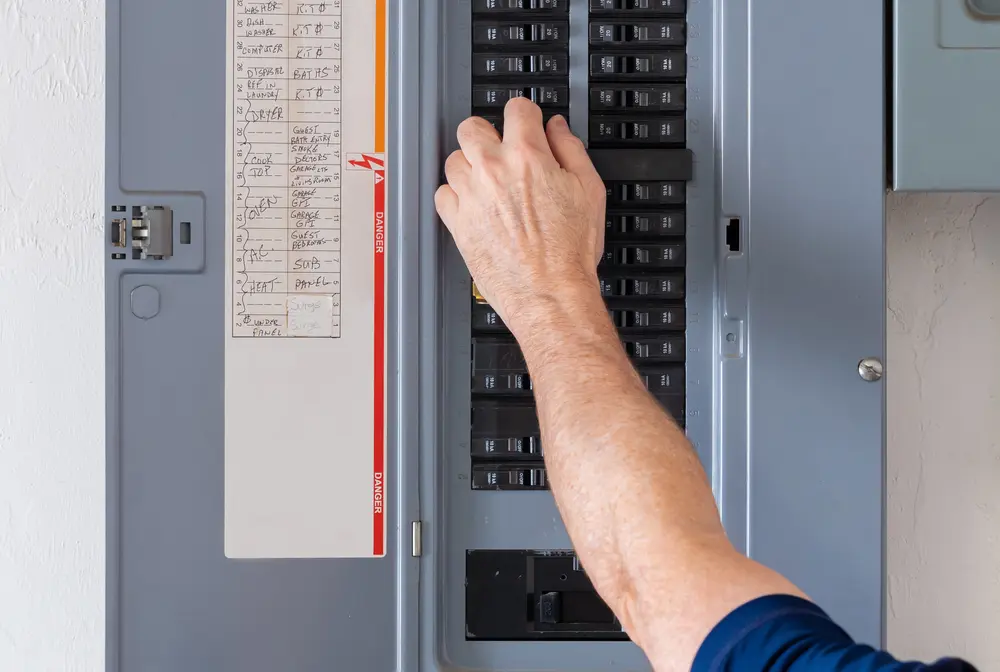
From electrical issues to equipment malfunctions, several factors can cause an AC unit to keep tripping the breaker. Let’s explore some common causes and cover ways to diagnose and resolve this issue.
What Is an AC Breaker?
An AC breaker is a safety device that protects the electrical circuit that powers your air conditioning system. It’s typically located in your home’s electrical panel or breaker box. The AC breaker acts as a switch that can be turned off manually to interrupt the flow of electricity to the AC unit in case of electrical faults, overloads, or short circuits.
When a problem arises that could damage the electrical system or pose a safety hazard, the breaker automatically trips, cutting off power to the AC unit to prevent further damage or fire hazards.
Why Does My AC Breaker Keep Tripping?
Your AC can trip the breaker after five minutes due to various factors, including:
- Electrical overload
- Dirty air filters that restrict airflow
- Refrigerant leaks that cause the compressor to overheat
- Faulty capacitors or relays that draw excessive current
- Compressor issues
- Faulty wiring that leads to short circuits
- Extreme weather conditions
- Internal AC unit problems.
These issues can disrupt the normal function of the air conditioning system, leading to repeated breaker trips to prevent electrical damage or fire hazards. Identifying and addressing the underlying cause is essential to ensure the safe operation of your AC unit.
7 Common Causes of Your AC Breaker Tripping
Clogged air filter.
A clogged air filter is a common culprit of AC breaker trips. When the air filter becomes clogged with dust, dirt, and debris, it restricts airflow to the AC system. As a result, the system has to work harder to pull in air, causing increased strain on the components. This additional strain can lead to overheating, particularly in the compressor and motor, which may cause the breaker to trip to prevent damage or electrical hazards.
Regularly changing or cleaning the air filter helps prevent this issue and ensures proper airflow, reducing the likelihood of breaker trips and extending the lifespan of your AC system.
Dirty Condenser Coils
Condenser coils dissipate heat from the refrigerant, allowing the AC system to cool your home. However, when the condenser coils become coated with dirt, grime, and debris, their ability to transfer heat is compromised. As a result, the AC compressor must work harder to maintain the desired temperature, leading to increased energy consumption and strain on the system. This can cause the compressor to overheat and trip the breaker as a safety precaution.
Regularly cleaning and maintaining the condenser coils helps prevent this issue, ensuring optimal performance and minimizing the risk of breaker trips.
Worn or Broken Coil Fan
The coil fan, located in the AC system’s outdoor unit, plays a vital role in dissipating heat from the condenser coils. If the coil fan becomes worn out or malfunctions due to wear and tear, debris accumulation, or electrical issues, it may fail to remove heat from the coils. The AC compressor may run hotter than usual, leading to increased power consumption and strain on the system, which can trigger the breaker to trip to prevent further damage.
Regular inspection and maintenance of the coil fan will help you identify and address any issues early on, reducing the risk of breaker trips and ensuring efficient cooling performance.
Faulty Parts or Wiring
Faulty electrical components or damaged wiring within the AC unit can cause electrical faults or short circuits, which may lead to breaker trips. Common culprits include defective capacitors, relays, contactors, or wiring issues such as frayed or corroded wires. When these components malfunction, they can disrupt the normal flow of electricity within the system, causing the breaker to trip as a protective measure.
Have a qualified HVAC technician inspect and repair any faulty parts or wiring to ensure the safe and reliable operation of your AC system.
Low AC Refrigerant
Refrigerant is essential for the cooling process in your AC system, absorbing heat from indoor air and transferring it outside. If the refrigerant levels are low due to leaks or improper charging, it can affect the system’s ability to cool effectively. Low refrigerant levels cause the AC compressor to work harder to achieve the desired temperature, leading to increased energy consumption and strain on the system. This can result in an overheating compressor and subsequent breaker trips.
Professional inspection, leak detection, and refrigerant recharge are necessary to address this issue and prevent further damage to your AC system.
Frozen Evaporator Coil
A frozen evaporator coil is a common issue that can lead to AC breaker trips. When warm air from your home passes over the cold evaporator coils, moisture in the air condenses and freezes on the coils’ surface. This ice buildup restricts airflow and reduces the system’s ability to absorb heat, causing the AC unit to run continuously to achieve the desired temperature. The increased workload can lead to an overheating compressor and motor, triggering the breaker to trip as a safety precaution.
Thawing the evaporator coil, identifying and addressing the root cause of the freezing (such as low refrigerant levels or restricted airflow), and regular maintenance can help prevent this issue and ensure the efficient operation of the AC system.
Grounded Compressor
A grounded compressor occurs when the electrical winding inside the compressor comes into contact with the outer casing, creating a ground fault. This problem can happen due to insulation breakdown, compressor motor failure, or physical damage to the compressor. When the compressor becomes grounded, it can cause a short circuit or electrical overload, leading to the breaker tripping to prevent electrical hazards or damage to the system.
Fixing a grounded compressor requires professional diagnosis and repair by a qualified HVAC technician to ensure safe and efficient AC operation.
Rely on Randazzo to Fix Your Tripping AC Breaker
We understand the importance of maintaining a comfortable home environment, especially during the hot summer months. With our comprehensive air conditioning and electrical repair services, homeowners in Macomb, MI , and surrounding areas like Detroit, Ann Arbor, Farmington Hills, and Troy can trust us to keep their homes cool and comfortable year-round.
Whether you’re dealing with AC breaker trips, electrical coding issues, or another HVAC concern, the Randazzo team will provide the reliable solutions you need.
Contact Us Now
Recent Posts
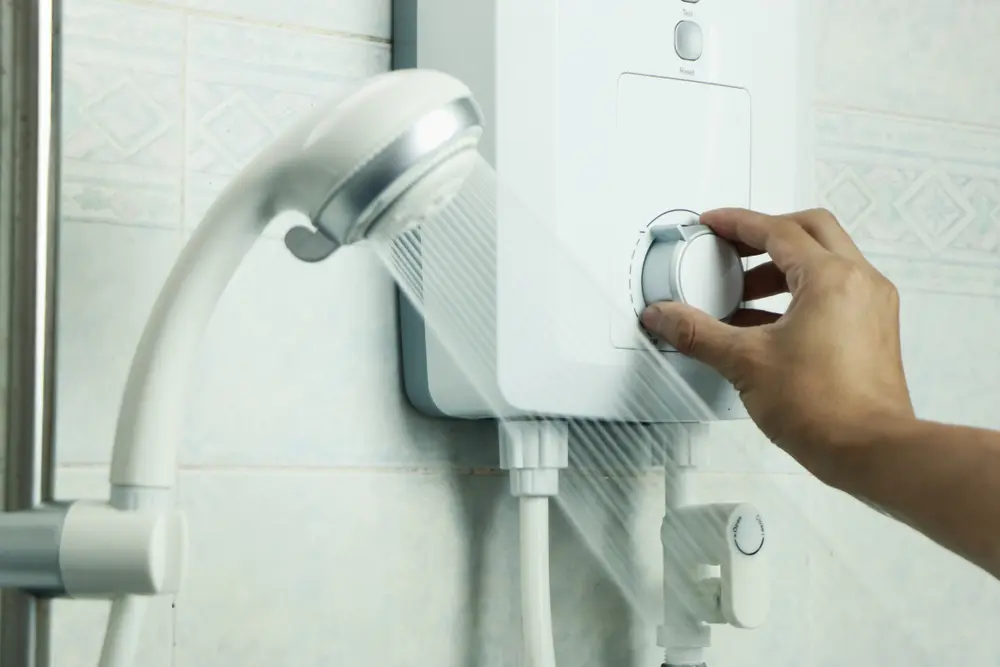
Why Is My Hot Water Running Out Quickly?

What Temperature You Should Set Your Air Conditioner to in the Summer
- First Name *
- Last Name *
- Service Needed Heating Air Conditioning Electrical Water Heater
- Tell Us More
- Yes! Sign me up for the marketing email list.
BOGO is BACK!
($95 value), payments as low as $59/month + free air scrubber, festive financing, request service.

Why Choose Randazzo?
We’re the name you know.
- Licensed & insured
- Service all brands
- Free estimates on replacement quotes & service calls
- Background-checked technicians
- Financing options
- Lennox Premier Dealer
- Committed to excellence
- Bryan-College Station
- Corpus Christi
- Dallas-Fort Worth
- San Antonio
Why Does My AC Keep Tripping the Breaker?

The AC is our best friend on blistering hot days. But it can also be our worst enemy if it keeps tripping the breaker and interrupting our cold air supply. It can be tempting to keep resetting the breaker so you can feel comfortable again, but that will only do more harm.
So, what should you do if your AC keeps tripping the breaker? Here are some ways to troubleshoot the issue and enjoy cool air again. If none of them work, there’s a more complex underlying problem that requires the attention of a pro. Contact an HVAC specialist who can get to the root cause and fix it.
What To Do If Your AC Keeps Tripping the Breaker
Breakers are safety devices in your home that prevent short circuits and overloads. Your AC’s breaker will trip when the unit pulls in more amps than the breaker can take. For example, a 20-amp breaker will trip if the AC uses 30 amps. It trips to protect the AC from damage and prevent a house fire.
Here are the most common reasons that cause your AC to trip and what you can do about them.
Dirty Air Filter
A dirty air filter is the culprit behind many AC issues, including a continuously tripping breaker. If your AC’s filter is full of dirt and debris, that will hamper airflow and cause the unit to overheat. Your AC has to work harder and longer to circulate air inside its system, causing it to use more electricity and overheat. That’s when the breaker will step in and trip.
This issue is easily preventable if you regularly replace your filter. Clean or replace your AC’s air filter every three months. You might have to do so more frequently if you share your space with furry family members.
Dirty Condenser Coils
The condenser in your AC’s outdoor unit dissipates the heat collected from your home. But it can’t do its job if there’s grime all over the condenser coils. Your AC will keep working to disperse the heat, pulling in more and more electricity. That will cause a short circuit, and the breaker will trip.
Schedule yearly AC tune-ups with an HVAC professional to prevent this issue. The HVAC technician will have the right cleaning products and tools to restore your AC’s condenser coils to their original state. Your AC can work efficiently again without constantly tripping the breaker.
Damaged Coil Fan
Your AC has a coil fan that blows air over the coils, dissipating heat from inside the unit. The coil fan runs on a motor that wears down over time and becomes less efficient. It’ll start consuming more energy and eventually burn the fan out. The jump in electricity usage can trigger the breaker to trip.
Replacing a coil fan motor is a complex task, even for homeowners with some DIY know-how. Let an HVAC specialist handle the necessary repairs or replacements. Your AC will be running smoothly again sans any breaker trips.
Malfunctioning Compressor
The AC compressor plays a crucial part, pressurizing the refrigerant and increasing its temperature as it passes through the system. However, the compressor can develop start-up issues over time and consume more energy than usual. That explains why the breaker keeps tripping.
Your AC should turn on in a second or two, but you likely have a compressor issue if it takes longer or your AC doesn’t turn on . Get professional help if you’re experiencing this. The HVAC specialist will assess the situation and provide the best solution, including replacing the compressor if it’s beyond repair.
Wiring Issues
Your AC may be simple to use, but there’s a complicated system of wires inside. These wires can become loose over time and cause electrical arcing. This is when the current jumps across a gap in the circuit, and it can lead to a house fire. If your AC’s breaker keeps tripping, faulty wiring might be the reason.
Never attempt to fix wiring issues yourself, even if you’re confident about your DIY skills. Let HVAC professionals handle this task. They will re-wire the circuit safely and have your AC running at its best again. They might also install a new metal plate to house all the wires.
Refrigerant Leak
Low refrigerant is another possible reason your AC’s breaker is constantly tripping. When your AC has insufficient refrigerant, it can’t handle large loads and your AC won’t be able to cool enough . The breaker will sense the danger and trip as a safety measure. A leak in the system can cause the refrigerant level to fall below the required amount needed for the AC to run efficiently.
A refrigerant leak isn’t something to take lightly. Prolonged exposure to refrigerant is hazardous to human health. Get professional help immediately if you suspect a refrigerant leak. An HVAC specialist will find and patch up the hole or replace the damaged component.
Most AC issues related to a tripping breaker are complex. Even the most experienced DIYers may not have the tools and skills to resolve them. Instead of stressing, sit back and let an HVAC specialist do the work. The technician will identify the root cause and resolve it before it snowballs into a more costly problem.

Dirty Condenser Coil Symptoms to Look Out For
Dirty condenser coils can spell trouble for your AC. They can cause various issues, leaving you hot and stuffy inside your home. It’s normal for your AC’s condenser coils to accumulate dust, dirt and debris over time. Here are some signs it’s time to have it cleaned.
Your Utility Bills Are Soaring
If you use your AC regularly, you probably know how much energy it consumes monthly. If your utility bill is higher than usual, that’s a sign of a clogged condenser coil. It’s hampering your AC’s efficiency and driving up its energy usage. Regular coil cleaning should boost your AC’s performance and return your utility bill to normal.
Your Unit Is Working Longer
Is your AC taking hours to cool your space down when it only needed half an hour before? You hear the blower running tirelessly and the ducts spewing air, but you still don’t feel any relief. If your unit has to work longer, its condenser coil might be dirty and hampering efficiency. That can cause the AC’s components to wear down, shortening its lifespan.
It Does Not Feel As Cool
The whole point of having an AC is to feel comfortable even on the hottest days. It’s frustrating when the AC is on but you still feel hot and miserable. If your AC fails to cool down your home, the condenser coil probably needs a thorough cleaning. Dirt is likely trapping the heat in the condenser coil, explaining why your AC is blowing warm air.
The Condenser Coil Is Frozen
Dirt and condensation are a bad combination to have on a condenser coil. It can cause the coil to freeze, preventing it from dissipating the heat inside your home. The result is an AC with no cooling capabilities. If your AC’s condenser coil looks icy, that’s a sign that it’s dirty and needs professional cleaning.
It Feels Humid Inside Your Home
High humidity levels at home can leave you feeling sticky and uncomfortable. But that’s not the worst of it. It can also lead to water damage, mildew growth and health problems. If your AC can no longer remove the excess moisture in the air, its condenser coils are probably clogged. Cleaning it should help with your humidity issue at home.
If you notice any of these signs, do your AC and yourself a favor and have a professional come clean the condenser coils. HVAC technicians will remove all the dirt and debris to restore the condenser coil’s function. Your AC will run more efficiently, and you’ll feel comfortable in your home again.

What Is a Grounded Compressor and What Causes It?
The compressor plays a crucial role in the AC system, pressurizing, heating and cooling the refrigerant. Unfortunately, compressors only have a lifespan of 10 to 15 years and will eventually fail. It’s not uncommon for homeowners to experience a grounded compressor or a compressor short to ground.
That happens when the compressor’s electrical winding breaks and hits the compressor’s side. That causes the oil to leak and ignite, leading to a compressor short to ground. It’s an electrical phenomenon where the electric current within a circuit redirects itself to the ground.
Compressor issues are for the pros to handle. Contact an HVAC specialist to replace your compressor and inspect the refrigerant lines.
Let the Pros Solve Your AC Troubles
Many homeowners have a love-hate relationship with their AC. It’s great when it’s working but frustrating when it’s acting up. If your AC has been stressing you out, HVAC professionals can help take the load off your shoulders. They will sort it out and get your AC performing at its best again.
ABC Can Diagnose and Fix AC Problems
It can be concerning when you notice your AC is not working properly. If you’re concerned about your AC unit, contact ABC Home & Commercial Services. Our licensed professionals can provide any needed AC diagnosis and repair and are available all day and all night. Our experts can even provide routine AC maintenance to help prolong the life of your system. We can help with all AC issues like your AC not cooling below 75 degrees .

- Privacy Policy
- ABC Main Home Page

Why does AC Circuit Breaker Keeps Tripping and How to Fix It

Is your ac unit constantly tripping the circuit breaker ? Do you find it in constant need of repair? In this article, we break down the cause and effect behind problems with an AC unit’s circuit breaker, and solutions you can use to fix the problem.
What can cause an AC tripping circuit breaker?
Are you wondering “Why is my air conditioner tripping the breaker?” A circuit breaker can fail or trip for a variety of reasons. A few of the main culprits could be:
The breaker could be unreliable
While rare, a once-sturdy and reliable switch can weaken over time and trip, or even stop working entirely. This is easily solved by buying a new one and replacing the switch , either yourself or at the hands of a professional technician.
The compressor and/or fan can draw too many amps
This problem can have a variety of causes:
For example, if a motor gets stuck and doesn’t react properly to applied voltage, it will pull more amps. This can cause heat to generate in the wiring and cause the ac unit tripping breaker. While not tripping it automatically, it can trip when the thermostat signals the AC to turn on.
This pattern often happens with the compressor when the cool season starts . The compressor pumps refrigerant through the lines, and when this component fails or works irregularly, it can cause problems with the circuit breaker as well.
If the capacitor is in working order, adding a hard-start capacitor to the circuit can give it the boost it needs to spin the motor and get things going. Beware, however; this is an indication of a failing unit. Consider budgeting for a new compressor or ac unit, as it may fail at an unexpected time.
Short circuiting
A breaker can also trip because of an electrical short . This is caused when hot wire touches a path it’s not supposed to, such as a neutral wire. When the system is on and the power is active, the system can overload and the breaker can trip. The breaker will instantly trip when voltage is applied.
Touching wires
The breaker will also trip if a wire from the motor touches the inner walls of the compresso r. The windings within the motor help spin the motor sheath, and these windings should be covered to shield the wiring. However, this is still a cause, primarily on older systems that have been active for 10-20 years or longer. The electricity grounds into the floor, and the ac unit keeps tripping breaker.
Incorrect refrigerant pressure
Refrigerant pressure at the wrong level can trip the AC breaker and cause other trouble. High levels of refrigerant pressure causes the compressor to strain to work properly, causing a breaker trip eventually. This problem is rarer than other ones, but can look like a bad compressor.
We are Sacramento air conditioner installation experts
How to solve problems when AC keeps tripping breaker
When the breaker is unreliable.
This problem is easily solved by buying a new breaker and replacing the switch, either yourself or at the hands of a professional.
Look for identifying signs of short circuiting: visible burns on wiring, burning smells, or flickering lights. Confirm potential shorts with a multimeter.
When wiring is out of place
If a breaker is tripping because exposed wires are touching the inner walls of the compressor, covering the exposed wires will shield the current.
When refrigerant pressure is incorrect
Removing a pound of refrigerant should indicate a pressure issue, and your gauges should vary a bit. If this happens AND the temperature splits hovers between 18-22 degrees, you can remove refrigerant until the compressor amps drop below the RLA, and the temp split remains within range. If removing the refrigerant isn’t working, you might want to replace all the old refrigerant with virgin refrigerant and a factory charge. If you’ve done this and checked all other components on the system, and the compressor still pulls high amps, you have a bad compressor.
These are just some of the reasons your home’s circuit breaker would trip the breaker in the main electrical panel. If it trips immediately when turning it back on, it is likely a wiring problem. If it trips after a certain time period, there is an issue with a component in the AC system.
Let a professional do the fixing. We don’t advise that anyone take on these problems by themselves, and as a matter of fact, you might not even be able to purchase the parts you need for a DIY fix. Contact a profession to diagnose and fix the problem for the best possible outcome.
Looking for a quality AC repair in Sacramento Area?
How can maintenance prevent my AC tripping breaker?
Active maintenance on your AC unit will prevent wear and tear on the unit, and extend both its lifespan and quality. Think of an AC unit as a car engine; changing the oil or filling the tires can help prevent much larger issues later on. In the same way, monitoring your HVAC system can help prevent large-scale over time. To solve the question of “Why does my air conditioner breaker keep tripping,” we outline below how you can actively clean and maintain your AC unit.
To begin, read the manufacturer manual
If you don’t have a paper manual, you may be able to find it online. Make notes of maintenance periods and dates for your ac unit and all other components of your HVAC system; chillers, boilers, motors, etc. These manuals provide a standard for your HVAC upkeep, and work to keep your house in proper order.
To clean off the external unit: (Condenser and Compressor)
Power off the main unit.
When cleaning the ac unit, you want to ensure no power is traveling through it. You can either remove the breaker/block or move the switch to the off position. If this isn’t possible, you can also switch off power to the AC condenser at your main electrical panel.
Clear debris in and around the unit
Most debris will get stuck in the condenser fins, and this area needs to carefully be cleaned away. You can use a rough paint brush to deal with easy-to-remove debris, and follow up with your vacuum and brush attachment. Remove debris and plant growth that is within 2 feet of the unit.
Clean and straighten the AC fins
Fins can collect debris that is not easily removed with a brush. Instead, an old knife can scrape out debris that is stuck between the fins, and reshape any damaged or bent fins.
Clean the condenser fan
This is another area where debris needs to be cleaned regularly. This component can be wiped with a damp cloth and left to dry in the sun.
Cleaning the fins inside out
The best way to clean the fins is by spraying them with a garden host. This removes caked-on dirt that other methods wouldn’t dislodge. Take care to not get water on the fan motor, and if the motor doesn’t have sealed bearings, check the fan lubrication as well. A few drops of electric motor oil should work nicely.
To clean the internal unit: (Evaporator and Blower)
Clean the evaporator coil.
The evaporator coil door can be found inside the blower/furnace unit and accumulates lots of debris. Use a soft brush to remove dust, then spray with a no-rinse coil cleaner to remove other gunk and improve efficiency.
Clean the evaporator drain
The evaporator drain can get clogged due to algae and mold buildup, and needs to be unplugged. A clogged drain can cause flooding and stop the unit from functioning until the water is drained. Clogs can also cause odor to build up and leak from the unit. A wet/dry vacuum cleaner can remove debris from the evaporator drain.
Change the blower filter
This step changes depending on where you live. In dusty environments (such as here in Sacramento), filter changes are necessary more often, typically right before the starting of the “heating” and “cooling” seasons. The filter is typically found at the end of the fresh air return duct.
Completing all these steps should ensure your HVAC and AC unit stay clean and regulate temperature more effectively. When all parts are dry and in place, you can turn on the power and test that the unit works correctly. This maintenance will prevent issues where the air conditioner trips circuit breaker.
Want to improve HVAC zoning cost and quality?
Consider Alpha Mechanical Your Trusted Partner
Still wondering “Why does my ac keep tripping the breaker?” After you have made all the necessary diagnostics to your HVAC unit and are still unable to get the system online, you may need help from your local professionals. Alpha Mechanical professionally services the people and equipment of Sacramento and the surrounding areas . With many years of service under our belt, Alpha Mechanical offers the best quality service and results for our customers.
Our experienced technicians are ready to help diagnose and repair any issue you might have with your AC and HVAC systems, all at an affordable price. We offer purchasing solutions with convenient coupons and partnerships with various banks to secure financing for our customers.
Final Thoughts
With this knowledge, you should be able to avoid issues where the air conditioner circuit breaker keeps tripping. To keep your AC unit working at its full capacity, make sure to clean and service it as necessary . To diagnose why an AC unit may be tripping the circuit breaker, try our tips above. Or, you can contact a NATE certified HVAC professional such as Alpha Mechanical for residential and commercial HVAC service in Sacramento .
Contact us 916.848.5980 and we will get your AC system working great again.
Frequently Asked Questions
AC breakers may be tripping due to faulty wiring, damaged or dirty components, and improper servicing can cause problems or total failure to an ac unit.
Here are some recommendations you can follow in order to prevent the AC breaker from tripping. Constantly inspect the unit for dirty/clogged components, loose wires, or damaged/failing parts. Replace or clean the parts, and if necessary, hire professional help for additional diagnosis and repair.
In order to extend the life of your AC unit, you can follow simple recommendations like, reading your unit’s manual to find unit-specific tips and maintenance dates. Keep components of the unit clean and serviced, and when necessary, hire professionals for in-depth and specialized service.
- Air Conditioning Issues
- Heating Issues
Learning Resources
Take the next step, we strive to put all our energy so that you save yours.
- Why Choose Us?
- Service Area
- Current Offers
No Results found
Please try again.
Click here if you would like to go to our northern Colorado site.

Why Does My Air Conditioner Keep Tripping the Circuit Breaker?
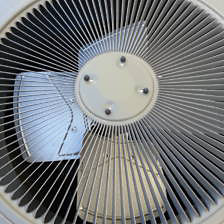
Did your AC suddenly shut off? Has your circuit breaker tripped?
If that just happened for the first time, reset the breaker and see if it trips again when you run your AC. If it doesn’t trip again, everything's probably fine.
But if the breaker does trip after you reset it, something’s not right. In this case, don’t try resetting it again.
Your circuit breaker is likely tripping because of these two reasons:
- Circuit or wiring issues.
- Your AC is using too much power.
We’ll go into more detail about both of these causes and what you can do to stop your air conditioner from tripping the circuit breaker.
Let’s start with circuit/wiring issues.
Cause #1: Circuit or Wiring Issues
The reason why your circuit breaker keeps tripping may not have anything to do with your AC at all. The problem could be with your circuit breaker and home wiring.
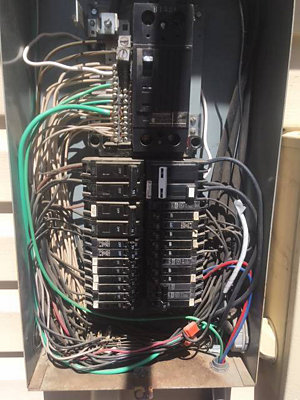
Wires in a circuit breaker panel
Loose Electrical Connections
Your breaker box has many connecting wires that can become disconnected or loose over time. Temperature changes cause wires to expand and contract, which is what makes them come loose.
Solution: An electrician will need to tighten the connections and replace any faulty wires.
Bad Circuit Breaker
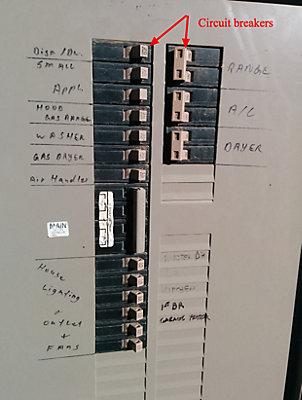
A residential circuit breaker
Your circuit breaker protects your home from electrical damage. With general wear and tear, breakers can go bad over time, too. You’ll know your circuit breaker is bad if you notice these signs:
- Circuit breaker is hot to the touch.
- Burning odor around the breaker.
- Black burn marks on the breaker.
- Frayed wires.
Solution: Contact an electrician to take a look at your circuit breaker. For safety reasons, you shouldn’t attempt any electrical repairs on your own home. Electrical problems require the skills and safety of a licensed electrician.
Cause #2: Your A/C is Using Too Much Power
Let’s say your electrical equipment is fine. The next step is to look at your AC, as it could be the culprit that’s causing your circuit breaker to trip.
Your AC will trip the circuit breaker if it’s drawing more amps than your breaker can handle. What causes your AC to draw too many amps?
There are many problems that cause your A/C to overheat and draw more power. Let’s go into a few of the most common issues.
Low Refrigerant, or a Leak
If your AC is leaking refrigerant, your AC will have to work harder, and use more power, to cool your home’s air.
Solution: Contact a licensed professional to replace your AC’s refrigerant and repair any leaks.
Bad Capacitor
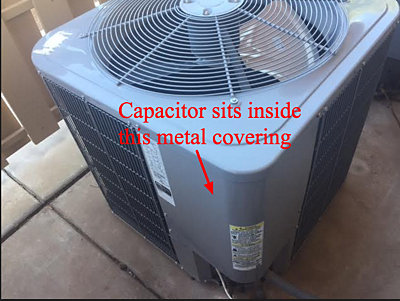
If your air conditioner is having trouble starting before the circuit breaker trips, it points to a bad capacitor. A capacitor is responsible for starting the compressor, and if the compressor has trouble starting, it could pull too many amps and trip the breaker. Sometimes capacitors wear out, so they’ll need to be replaced.
Solution: Contact an AC contractor to replace the bad capacitor.
Shorted Motor
Electric motors in your AC can run for a long time. But if a motor runs for too long, the insulation around the wires can deteriorate and cause an electrical short.
A short is when electricity bypasses its normal path like taking a shortcut, which allows more electricity to flow than the wires can handle. If you have a short, your circuit breaker will trip to prevent damage to your home and AC equipment.
Solution: With any electrical repairs, whether with your AC or home, need to be handled by a professional. Contact an HVAC contractor to determine if you have a shorted motor.
Grounded Compressor
A grounded compressor is the worst-case scenario on this list. Similar to a short, a grounded compressor occurs when an electrical winding within the compressor hits the side of the compressor. This causes a direct short to ground, which ignites the oil in the compressor and causes a burnout.
Before this starts a fire, your circuit breaker will shut the electrical current off, which is what causes your breaker to trip.
Solution: The bad news is if you have a grounded compressor, you’ll have to replace the compressor, which is more expensive, or the whole outside unit. If your compressor isn’t covered under warranty and your outside unit is old, it may make more sense to replace the outside unit instead of the compressor.
Need an AC Repair professional in the Denver area?
Contact Plumbline to schedule an AC repair today. We’ll get your air conditioner back up and running smoothly so your circuit breaker won’t trip anymore.
Related articles:
- Why Won’t My Home’s AC Turn On?
- SEER vs. SEER: Comparing A/C Efficiency Ratings For Your Denver Home
Need help from a Colorado Plumbing, Heating, Cooling, or Electrical Specialist?
For your convenience, you can request an appointment in one of two ways:
- Call us at (303) 436-2525 for immediate assistance.
- Click on the button below to schedule your appointment online.
Related Reading
Join our email newsletter.
Receive updates, current news, promotions, and industry tips.
You are using an outdated browser. Please upgrade your browser to improve your experience.
Looking for a new AC? Try our calculator for an instant estimate !
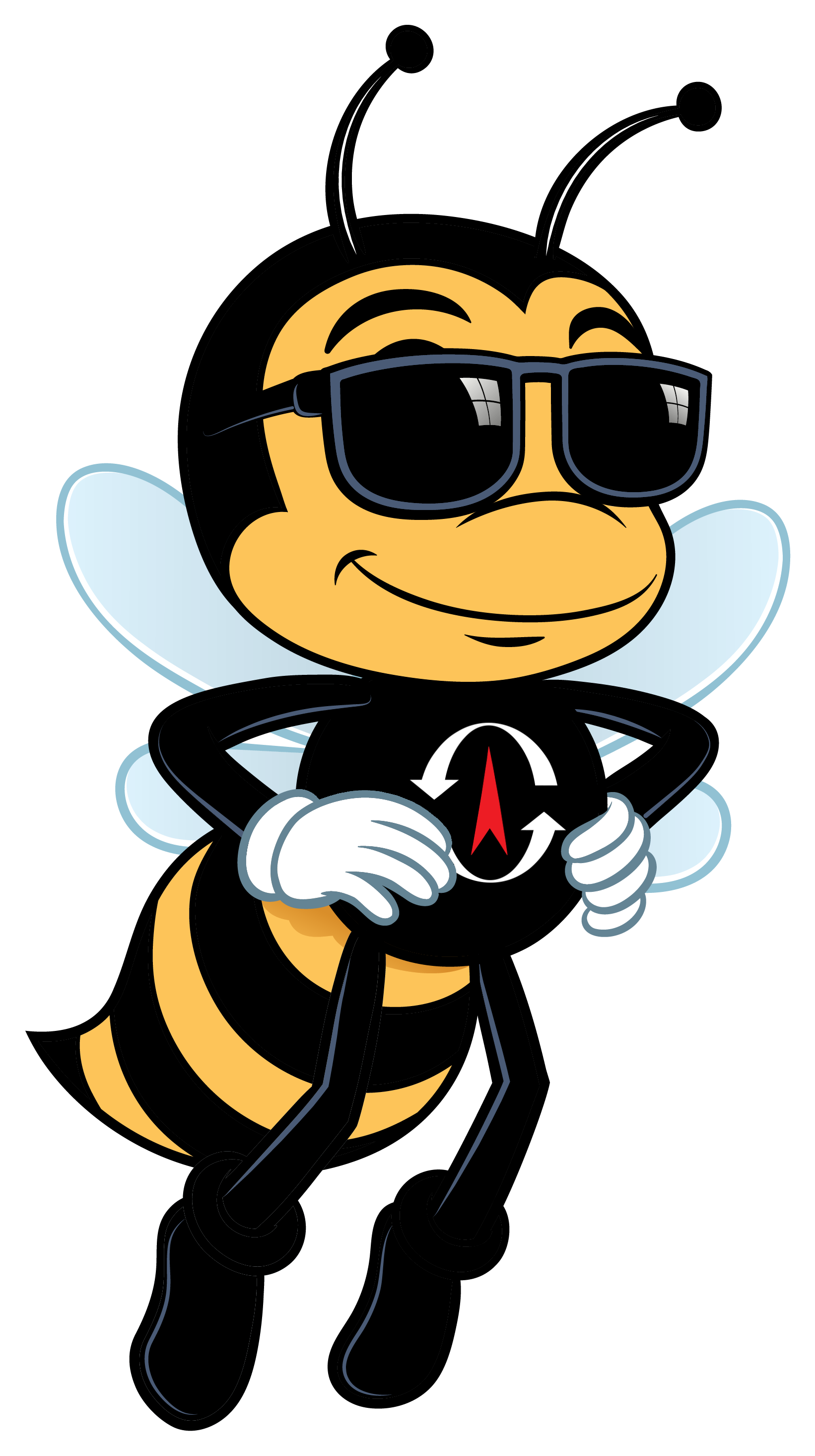
Why is My AC Tripping the Circuit Breaker?
October 04, 2021
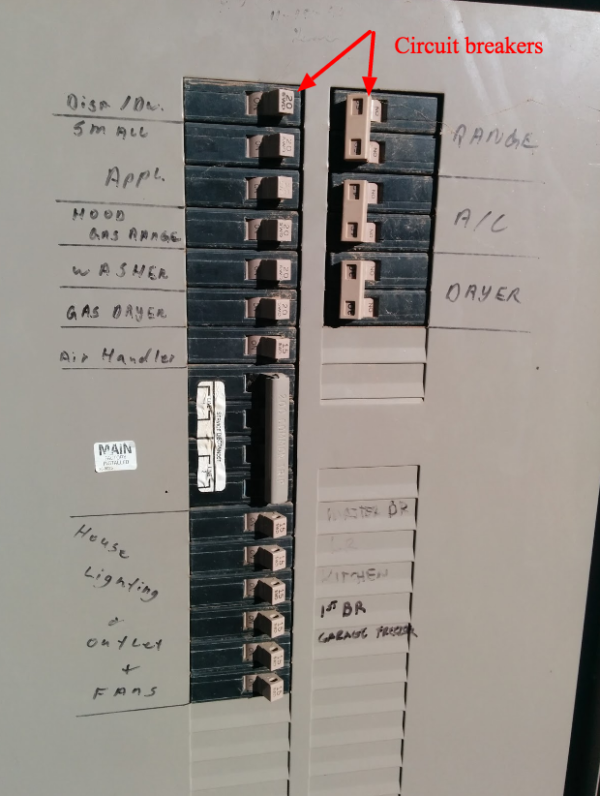
Air conditioners are vital to Floridians, so it's no surprise that homeowners would be stressed if their AC suddenly started turning off.
If this is happening to you now, it’s likely a tripped circuit breaker. When your AC trips the circuit breaker after running for only a few minutes, your breaker cuts the power to the AC system.
Why is your AC tripping the circuit breaker? Many issues can be at play, but the primary 3 reasons include:
- An overloaded circuit
- A grounded compressor
- A faulty breaker
We’ll review how to reset your circuit breaker to see if that restores your AC’s power. If it doesn’t, we’ll dive into the potential problems related to a tripped circuit breaker and how to troubleshoot them.
Want a professional to identify and fix your AC’s tripped circuit breaker? Contact Advanced Air for an AC repair . We provide punctual and round-the-clock service .
Reset your circuit breaker
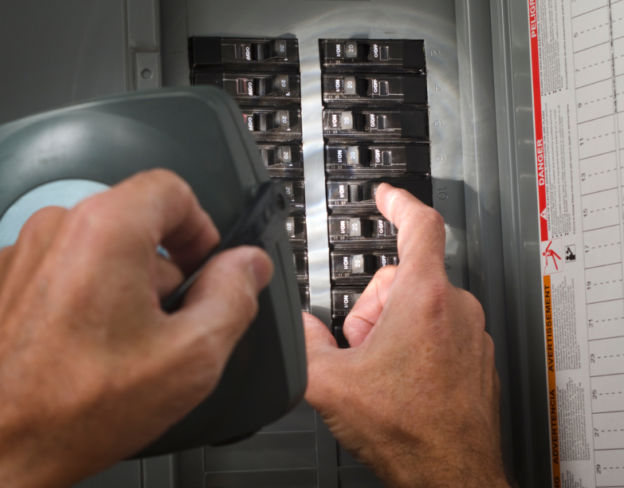
Reset your circuit breaker to see if it stops tripping
Before we look at what could be causing the frequent tripping, let's first try resetting the circuit breaker. You can do so by:
- Let the unit cool down for about 5 minutes. The Department of Energy recommends letting the unit rest before resetting any breakers.
- Turn off your thermostat.
- Locate your gray main circuit panel by checking your closets, garage, or basement. Make sure there's no water on the ground in the room with the panel. If there is, do NOT stand in the water while resetting the breaker.
- Find the AC switch. The breakers are typically labeled. If not, look for the switch that is either in a middle position or OFF. Some manufacturers have a visible color indicator that shows that a breaker has tripped.
- Push the switch OFF unless it's already OFF. If already OFF, skip to Step #6.
- Push the switch ON. You should feel a satisfying click into place.
- Wait for 30 seconds.
- Turn your AC back on to test.
If your AC immediately trips again, do NOT reset the breaker again until the cause is corrected. Multiple overcurrents, or surges of electricity, can damage your AC and even start a fire.
Read on to learn about the potential issues causing your AC to trip the circuit breaker.
Three main reasons behind your AC tripping the circuit breaker:
1. an overloaded circuit.
Circuit breakers shut off the flow of electricity whenever the number of amps (a unit of electrical current) exceeds its amp rating. For example, if the circuit breaker has a rating of 15 amps, it'll trip whenever 20 amps flow through the circuit.
So, whenever your AC is using too much energy, it's pulling in more amps than usual, causing a surge and your circuit breaker to trip.
Your air conditioner can use too much energy if:
The air filter is dirty:
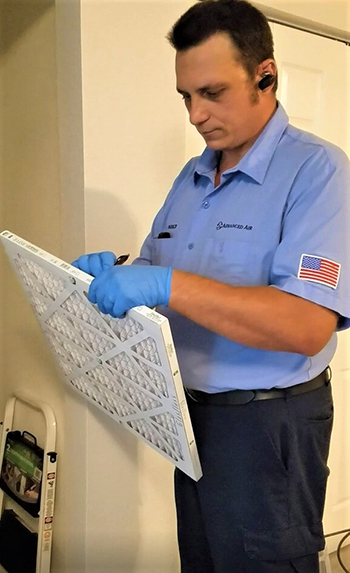
An Advanced Air technician can help you replace your filter
Air conditioners need air to be flowing into the system to cool your home enough to meet your set temperature.
When air filters get clogged with debris and dirt, they block airflow from entering the system. Your AC now has to compensate by working harder and using more electricity to cool your home. The circuit breaker isn’t used to this amount of energy consumption and trips to protect your AC.
The condenser is dirty:
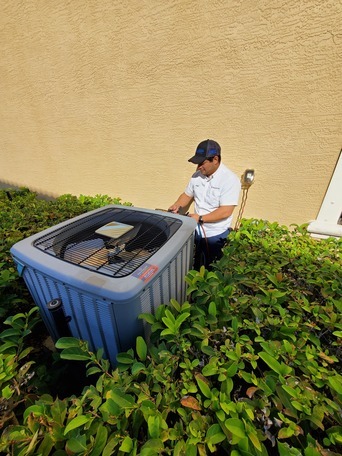
Our technicians can help clean your condenser
Your AC's outdoor unit is called the condenser. It plays an essential role in keeping your home cool by dumping the heat your indoor unit absorbs from your home's air outside.
When the condenser is dirty or blocked by bushes, your outdoor unit can no longer effectively transfer the heat outside, and your AC has to use more energy and take longer to cool your home. This increase in needed power trips the circuit breaker.
The condenser fan doesn't work correctly:
As we mentioned above, the condenser is your outdoor AC unit. The condenser's fan helps dissipate heat back outside. If you stand next to the condenser and can't hear the fan rumbling, it's likely broken.
When the fan’s motor is broken or worn out, the electricity from your AC system to the motor has nowhere to go and is flowing freely. Your AC will automatically detect this issue and trip your circuit breaker to prevent the wires from frying and damaging your system or home.
The refrigerant is leaking:
What is refrigerant? It's a cold substance in your AC that helps the indoor unit absorb heat from the air. Leaking refrigerant means your AC can't cool your home as effectively due to reduced heat absorption abilities, forcing it to use more power and tripping the breaker due to overload.
How do you know you have a refrigerant leak? You can tell when:
- You see ice forming on the condenser
- You hear hissing or bubbling noises coming from your inside AC unit
- You have higher than normal monthly energy bills
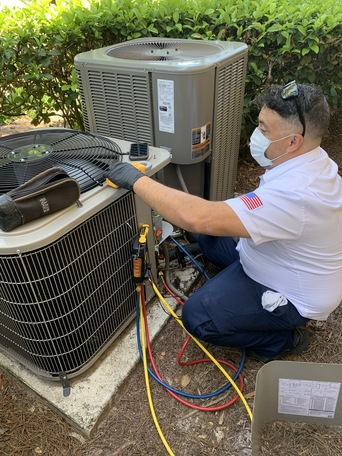
Advanced Air technicians can diagnose the problem behind your circuit tripping
If you suspect your breaker keeps tripping because of any of these reasons, try changing out your air filter monthly and booking an appointment with an AC technician to clean the condenser. Also, make sure to check your condenser's fan and inspect the refrigerant lines.
2. A shorted compressor
Typically, electricity flows in a loop called a circuit. When a compressor "shorts," it's because a malfunction interrupts the loop, allowing too much electricity to flow through the circuit. The circuit breaker then trips to shut off electricity to prevent the overload from potentially causing a fire.
Most malfunctions are because of a winding, where electrical currents pass through inside the compressor, breaking and not being able to handle its load anymore. The additional electricity ignites the oil in the compressor, causing a sudden current surge that burns out the compressor and forces the circuit breaker to trip.
Unfortunately, a burned-out compressor most likely needs to be replaced because a functional compressor is vital as it pumps refrigerant throughout your system.
Replacing the compressor can be expensive if you don't have a valid warranty. If you have a valid warranty, financing options can help. Or, you might want to look into replacing your system entirely. You can use our handy AC installation cost calculator to see if a replacement would be more cost-effective than replacing your compressor.
3. A faulty breaker
A damaged circuit breaker
Your circuit breaker may keep tripping because of an issue with the breaker itself.
To determine if the breaker is damaged, find your home's main circuit panel and look for indicators that you have a faulty breaker, such as:
- The breaker is hot when you touch it
- You can smell a burning odor near the breaker
- You see loose connecting wires
- You see burn marks on the breaker
- You see obvious worn-out parts
If you notice any of the above indicators, you're dealing with a faulty breaker that needs professional replacement. Call a technician immediately.
Contact Advanced Air to stop your circuit breaker from tripping.
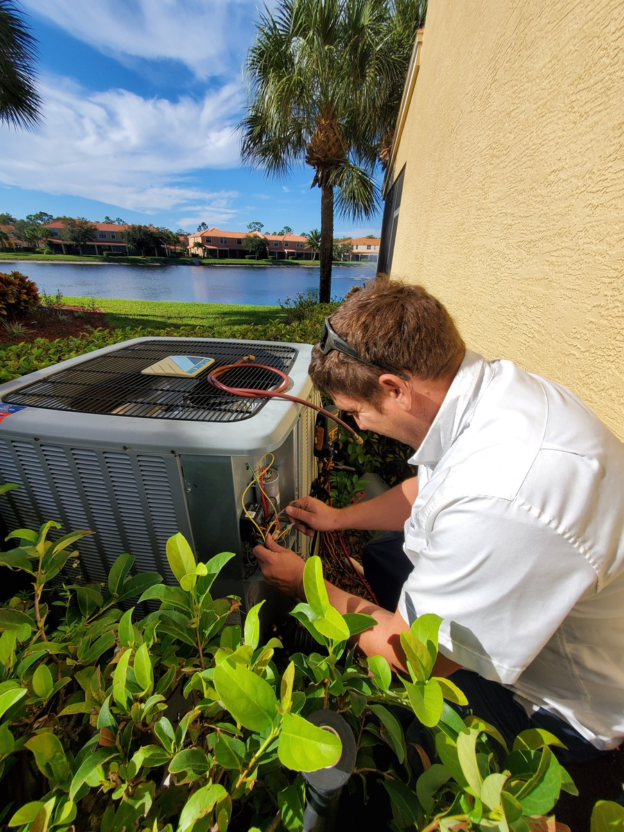
Advanced Air AC technicians are ready to help repair your AC
Advanced Air has been serving the Southwest Florida area for over 25 years, and our technicians are ready to help you get your AC back up and running the same day. Call us today at (888) 853-5143 or contact us by filling out the form below.
Not only do we provide prompt and reliable AC repairs , but we also back up our work with a 100% satisfaction guarantee .
- Air Conditioning
Similar Articles:
- What’s the Cost to Repair an Air Conditioner in Florida?
- 6 Loud Air Conditioning Noises and Their Causes

CHOOSE YOUR ARS NETWORK LOCATION
- Home »
- Blog »
- HVAC »
Help! My Air Conditioner Breaker Keeps Tripping
Are you trying to figure out why your air conditioner breaker keeps tripping? Your AC circuit breaker is an electrical system failsafe. When it trips, it's doing exactly what it's supposed to by protecting the overall system from the damaging effects of an overload.
First, do not continuously reset your AC circuit breaker! Now, you may want to isolate the origin of the issues. After that, you can establish whether it's an issue that you can address yourself or requires the attention of an HVAC repairman.
Learn more about dealing with an air conditioning unit that continuously gives you trouble and when to call in a professional AC technician.
What To Do When your AC Keeps Tripping the Breaker: Step 1
To begin diagnosing your system's problem, follow these steps:
- Turn off whichever AC system keeps causing the circuit breaker trips (including its thermostat functions)
- At the tripped panel, turn back on the tripped circuit.
- You want to wait at least 30 minutes with the AC off! It's essential to ensure any thermostat-controlled systems on the AC are also turned to the off position, so the internal systems within the system are not triggered.
- After waiting for a period that exceeds at least 30 minutes, turn the system back on.
Possible Results:
It continues to operate without tripping the circuit breaker.
That's great news! The AC tripping issue that led to the power surge was most likely a rogue issue that won't necessarily be repeated. Problems like these are primarily out of your control and external to the household, such as lightning. If the circuit breaker doesn't trip again, it has successfully performed its function, and you can continue enjoying your cool home without worries.
Also Check Out: Is It Safe To Run My Air Conditioner During a Thunderstorm?
It Works for a While, Then Trips Again
There is still hope that you can still safely address this issue yourself. Try replacing your air conditioner's air filter. A dirty air filter can cause the entire AC system keeps tripping the breaker, leading the unit to draw more power than is safe. This leads to a power overload and a circuit breaker trip. An AC air filter can usually be easily replaced by its owner. Check your system's instruction manual on how to complete that process.
It Immediately Trips Again
If the AC immediately trips the circuit breaker again, the problem has been successfully isolated to your outside AC unit. It is now the time to call in a professional air conditioner repair company to deal with many possible issues why your AC keeps tripping the breaker. Continue reading to learn more about those potential issues.
Why Your AC Circuit Breaker Keeps Tripping
There are several reasons your system is having this problem, including:
- A condenser coil is covered in dirt, debris, and grime.
- A physical component of your AC's electrical system could be loose or damaged.
- The AC's fan motor has issues that could lead to a power overload.
- An evaporator coil may not be releasing heat as it should.
- Damaged lines that cause a refrigerant leak.
- The AC compressor failed.
Learn more about these problems and how you can identify them, so you know what to tell an HVAC technician when they arrive.
Dirty Condenser Coils
Have you noticed your air conditioner hasn't been cooling your home as well as when you first had it installed? This might be tied to why your AC system keeps tripping the breaker. If you've noticed a gradual decrease in your air conditioner's functionality, the issue is most likely dirty condenser coils.
The condenser coil's function is to create a way to release heat gathered by the AC, expelling it outside of your building. It's located in the part of the outdoor unit of your household. Due to its location, the coil can become covered with dirt and other debris from natural elements. When this occurs, the system must work harder to maintain performance.
An overworked system will attempt to draw more power and be the reason why your AC system keeps tripping the breaker. Neglecting to have necessary regular maintenance done is likely why your AC keeps tripping the breaker.
For the reasons concerning high voltage stated above, a professional is required to address this issue.
Failure of an Electrical Component
An electrical component failure within your unit is a catchall phrase referring to many possible scenarios that could be the reason why your AC circuit breaker keeps tripping. Electrical wiring could have become frayed, too much power was sent to the unit, or an electrical short may have cut its function.
Pinpointing why your AC system keeps tripping the breaker requires specific electrical tools and can be dangerous to perform independently. However, identifying the problem could save you from the costly decision to replace the entire system.
You must reach out to a professional to perform this high-level assessment of your air conditioner's electrical system due to its complex nature and potential risks.
The Motor for Your Air Conditioner's Fan Has Malfunctioned
Moreover, the same elements that may have affected your condenser coil can also put pressure on your air conditioner fan's motor. The result leads to your AC system fan not spinning as we are common to seeing.
When any part of an electrical system has to work harder to overcome obstacles, it will draw too much electricity to remain proficient in its function. This could be the reason your air conditioner tripping the breaker.
As you know by now, this tendency to draw more power than is safe will lead to your circuit breaker to trip to safeguard the entire household's electrical system. This diagnosis with your AC blower motor for why your AC keeps tripping the breaker often comes with a repair that requires a professional to address because of the fan's proximity to high voltage components.
The Air Conditioner Evaporator Coils are Frozen
Have you noticed ice on your air conditioning system coils? This could be the reason your AC circuit breaker keeps tripping.
If you've neglected to have annual or biannual maintenance done on your air conditioner system, debris may have caused there to be reduced airflow in your system. This can lead to the freezing of the evaporator. Again, the system attempts to compensate for these obstacles by drawing more power. Your home's circuit breaker will trip to safeguard the entire system.
Also Check Out: AC System Freezing Up: How You Can Fix It The First Try
Refrigerant Leaks
Older systems whose owners have neglected to perform maintenance may have developed leaks in refrigerant lines. This corrosion is part of the natural wear and tear that comes with time.
Over time, the level of the refrigerant fluid will drop, and you will notice a decline in your air conditioner unit's performance. Your air conditioner circuit breaker keeps tripping because it's attempting to overcompensate, leading to the circuit breaker trip.
Compressor Failure
Your grounded compressor failing is the most catastrophic of the potential issues, causing your air conditioner to keep tripping the circuit breaker.
Not only could this be the reason your air conditioner's circuit breaker keeps tripping, but a compressor's failure often results in a need for unit replacement because of its overall importance to the entire air conditioning unit's function. Again, this is an issue that can be extremely dangerous for untrained individuals to attempt to repair.
A Safety Warning
All these potential causes for why your AC breaker trips require a trained professional HVAC contractor specializing in air conditioners or a certified electrician. All the repairs to these individual elements of the AC involve high voltage and can be dangerous undertakings.
Don't attempt to address any of these issues relating to why your ac system keeps tripping the breaker yourself, as this can be highly unsafe. Please get in touch with an HVAC professional.
However, as a responsible owner of an AC unit, you should seek to know more about why your air conditioner system keeps tripping the breaker. According to FEMA, twenty-four thousand residential electrical fires are reported yearly in the United States alone.
Some of the issues that are the exact reason your AC is repeatedly tripping the breaker could also lead to a fire that could have been prevented with annual or biannual maintenance by a professional.
The Importance of Regular Maintenance
If your AC system keeps tripping the breaker, it's likely related to an overdraw of power. If the problem doesn't fix itself after the 30-minute reset and air filter swap, it's time to reach out to a professional HVAC technician.
Breakers trip from time to time, and a one time power surge can cause excess power to shut off everything in a home. A bad circuit breaker or a cooling system that pulls more electricity than is required is not only bad for your home, but a real safety risk.
The good news is that many of these common problems can be avoided with regular AC system maintenance . If you never want to deal with an AC system and a tripping breaker, reaching out to a professional AC tech to have a look is still a great idea.
This may save you money in the long run and help further ensure your household's safety from dangerous consequences.
Need AC Repairs Now? Call ARS/Rescue Rooter
If your outdoor unit is not running properly, call the professional heating and air conditioning experts at ARS/Rescue Rooter for dependable air conditioner repair service. Our Comfort Specialists will assess your system and provide you a detailed plan to restoring comfort to your home.
Call us now at 866-399-2885 or find your nearest ARS/Rescue Rooter location to schedule air conditioning service today!
Sign-up For Our Newsletter & Enter To Win a FREE 50 Gallon Gas or Electric Water Heater! *
Searching for more knowledge to boost your indoor comfort? Sign up for our email newsletter and you'll receive expert tips and advice from our HVAC & plumbing pros. Plus when you sign-up. you'll be entered into a drawing to win a FREE 50 Gallon Gas or Electric Water Heater!
*Limit of one entry per household. Valid at participating ARS® Network locations and within their service areas. Void if copied or transferred and where prohibited. Any other use may constitute fraud. Cash value $.001. By entering the giveaway, you are agreeing to the full terms and conditions .
- Just for Fun
- Company News
Related Posts

Need service now?
We're here 7 days a week.
Change Locations:
Begin Live Chat

IMAGES
VIDEO
COMMENTS
Higher heat results in higher current draw resulting in your breaker tripping. Perform regular cleaning of these components. 6. Problem With Coil Fan Motor. Air conditioners use a coil fan (or AC blower) to move hot air over the condenser coil and disperse heat, leaving you with cold air.
And overheating leads to the AC tripping the breaker. In this case, the AC breaker won't turn trip immediately. It won't even trip in 5 minutes or so. Dirty condenser coils are one of the most common reasons why the AC trips breaker after a few hours. The AC will overheat in time and that can take anywhere from some 10 minutes to several hours.
The list starts with the common causes of AC breaker trips and the things that are easy to check. Here is the list: Bad capacitor. Dirty condenser coil. Bad condenser fan motor. Dirty air filter. Short circuit in the wiring. Compressor grounded out. Compressor windings shorted out.
Why It Happens: Like any other component, circuit breakers can wear out and malfunction. Solution: If you suspect this is the case, contact an electrician to replace the circuit breaker. 5. Dirty or Clogged Filters and Coils. Believe it or not, a dirty AC system can cause the circuit breaker to trip.
Understanding the Problem A. What causes an AC breaker to trip? Overloading the circuit: When the electrical load exceeds the capacity of the circuit, the breaker trips to prevent overheating and potential fire hazards. Electrical faults: Short circuits or ground faults can cause a sudden increase in electrical current, prompting the breaker to trip to prevent damage to appliances or wiring.
Overload: If your AC is drawing too much current, it can trip the breaker. 2. Short circuit: A short circuit in the AC unit's wiring can also cause the breaker to trip. 3. Dirty air filter: A clogged air filter can overwork the AC, leading to breaker trips. 4.
In this article, we'll explore the potential causes of this issue and provide helpful solutions. 1. Electrical Overload. One of the most common reasons for an air conditioner tripping the breaker is an electrical overload. When the demand for power exceeds the capacity of the circuit, the breaker trips to prevent damage to the system.
2. Dirty Air Filter. Dirty filters may cause your air conditioner to trip the circuit breaker. Reduced airflow means the fan motor must work harder and longer to draw air through the filter. This can draw too much electricity, causing the air conditioning unit to overheat and resulting in an electrical short.
Why Your Air Conditioner Circuit Breaker May Trip. A circuit breaker is designed to trip and cut off the power when it senses an overload on the circuit. This is a safety feature that protects the wiring from overheating and starting a fire. However, if the circuit breaker is faulty, it may trip even when there is no overload.
Here's why your air conditioner breaker keeps tripping (from best-case to worst-case scenario) The circuit breaker is faulty. This is the best-case scenario because it means that you need to fix the breaker, not your AC unit. It means that your issue will probably be less expensive to solve. There are a few reasons why this could happen.
Well, an air conditioner usually trips the breaker because it's pulling in more amps than the breaker is rated for. That is, if you have a 20-amp breaker and the AC pulls 30 amps, the breaker trips. That's why breakers trip: to protect you from over currents that can damage equipment and cause fires (yikes). So DON'T keep resetting the breaker ...
Check your air conditioner's filter. A clogged filter can cause the breaker to trip by overloading the circuit. Replace or clean it if needed. Look for any signs of damage on the wiring leading up to the AC unit. If the wiring looks frayed or damaged in any way, call a licensed electrician for help as soon as possible.
4. The Compressor Is Shorted Out/Shorted to Ground. If your AC breaker keeps tripping, a shorted out compressor is another likely cause. If it is, installing a new compressor is the solution, but it is usually best to replace the entire condenser, the whole outside component of your central air system.
Decoding the Reasons Behind Your AC's Frequent Circuit Breaker Trips. Several factors could be causing your air conditioner to trip the circuit breaker. Here are some of the primary culprits: Clogged Air Filter. A congested air filter can limit airflow, forcing your AC to exert more effort and potentially overload the circuit, causing a trip.
The most common reason for an AC breaker to trip is because it is overloaded. This means that there is too much current flowing through the breaker, and it trips to protect the circuit. Other reasons for an AC breaker to trip include a short circuit, a ground fault, or a faulty breaker. 5/5 - (1 vote)
1. A Dirty Air Filter. If you notice that your AC is tripping the breaker when it gets too hot outside, a dirty air filter may be to blame. Dirty filters can reduce airflow and cause AC units to overheat, resulting in a breaker trip. They also make it difficult for air conditioners to function efficiently at colder temperatures, so you might ...
7 Common Causes of Your AC Breaker Tripping Clogged Air Filter. A clogged air filter is a common culprit of AC breaker trips. When the air filter becomes clogged with dust, dirt, and debris, it restricts airflow to the AC system. As a result, the system has to work harder to pull in air, causing increased strain on the components.
It trips to protect the AC from damage and prevent a house fire. Here are the most common reasons that cause your AC to trip and what you can do about them. Dirty Air Filter. A dirty air filter is the culprit behind many AC issues, including a continuously tripping breaker. If your AC's filter is full of dirt and debris, that will hamper ...
Short circuiting. A breaker can also trip because of an electrical short. This is caused when hot wire touches a path it's not supposed to, such as a neutral wire. When the system is on and the power is active, the system can overload and the breaker can trip. The breaker will instantly trip when voltage is applied.
If your air conditioner is having trouble starting before the circuit breaker trips, it points to a bad capacitor. A capacitor is responsible for starting the compressor, and if the compressor has trouble starting, it could pull too many amps and trip the breaker. Sometimes capacitors wear out, so they'll need to be replaced.
Three main reasons behind your AC tripping the circuit breaker: 1. An overloaded circuit. Circuit breakers shut off the flow of electricity whenever the number of amps (a unit of electrical current) exceeds its amp rating. For example, if the circuit breaker has a rating of 15 amps, it'll trip whenever 20 amps flow through the circuit.
What To Do When your AC Keeps Tripping the Breaker: Step 1. To begin diagnosing your system's problem, follow these steps: Turn off whichever AC system keeps causing the circuit breaker trips (including its thermostat functions) At the tripped panel, turn back on the tripped circuit. You want to wait at least 30 minutes with the AC off!
This causes the AC to draw more electricity to cool your house, resulting in a breaker trip. Loose circuit breaker connection. Your AC could be functioning properly, but the connection between the unit and the breaker may be the issue. A loose wire or faulty breaker switch could make the breaker trip. Electrical short.